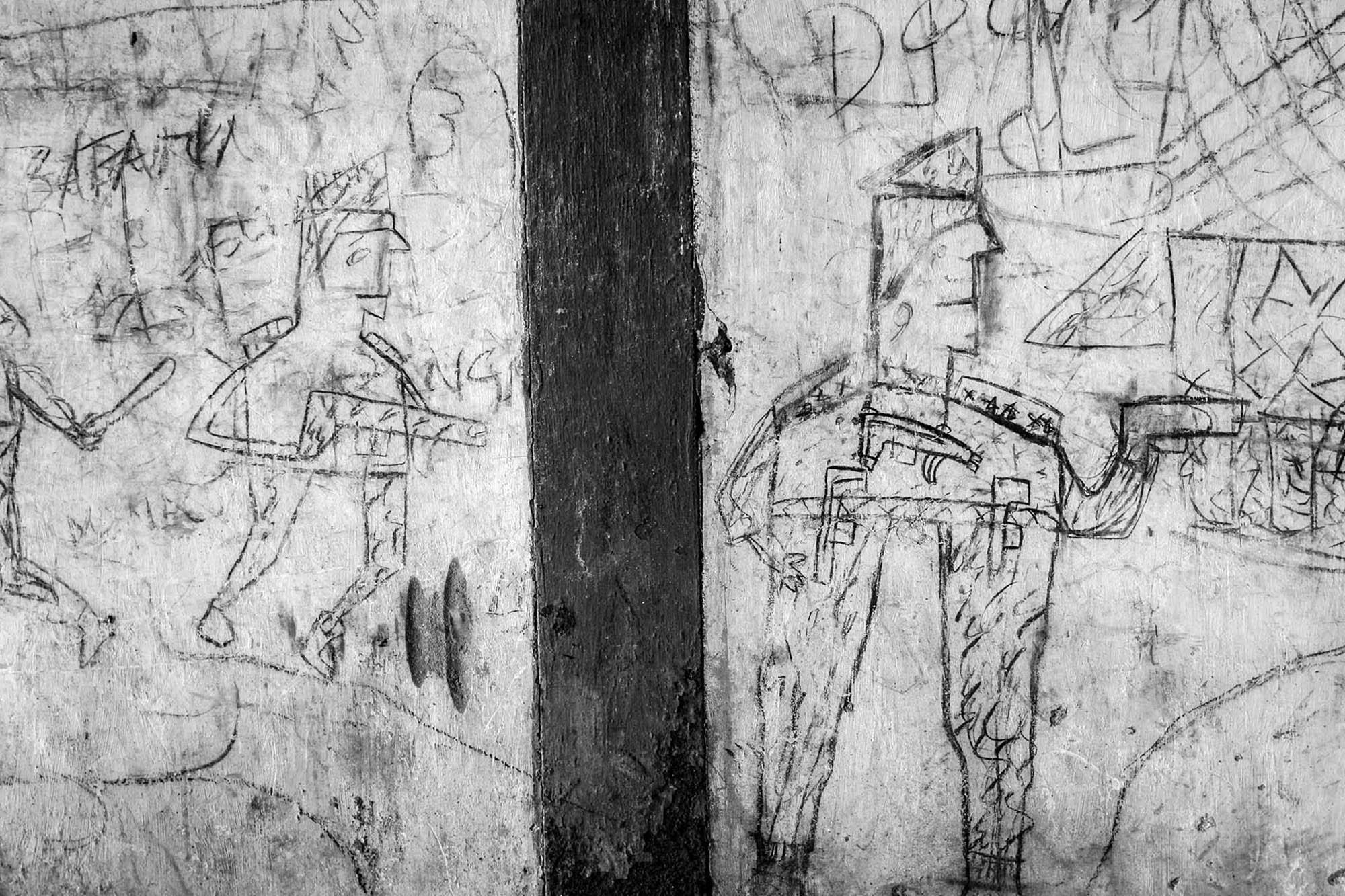
1 / 45
After more than 40 years of civil war and dictatorship, the Democratic Republic of Congo was left in ruins. Nearly 4 million people perished between 1998-2004, with 1,200 people dying each day. The majority of casualties resulted from preventable disease rather than directly from war violence. Malaria, diarrhea, respiratory infections and malnutrition topped the list, as a result of health services either being cut off because of the war or reduced because of limited access.
Children's drawings on a wall in the Village of Libenge, tells the story.
After more than 40 years of civil war and dictatorship, the Democratic Republic of...
READ ON
After more than 40 years of civil war and dictatorship, the Democratic Republic of Congo was left in ruins. Nearly 4 million people perished between 1998-2004, with 1,200 people dying each day. The majority of casualties resulted from preventable disease rather than directly from war violence. Malaria, diarrhea, respiratory infections and malnutrition topped the list, as a result of health services either being cut off because of the war or reduced because of limited access. Children's drawings on a wall in the Village of Libenge, tells the story.
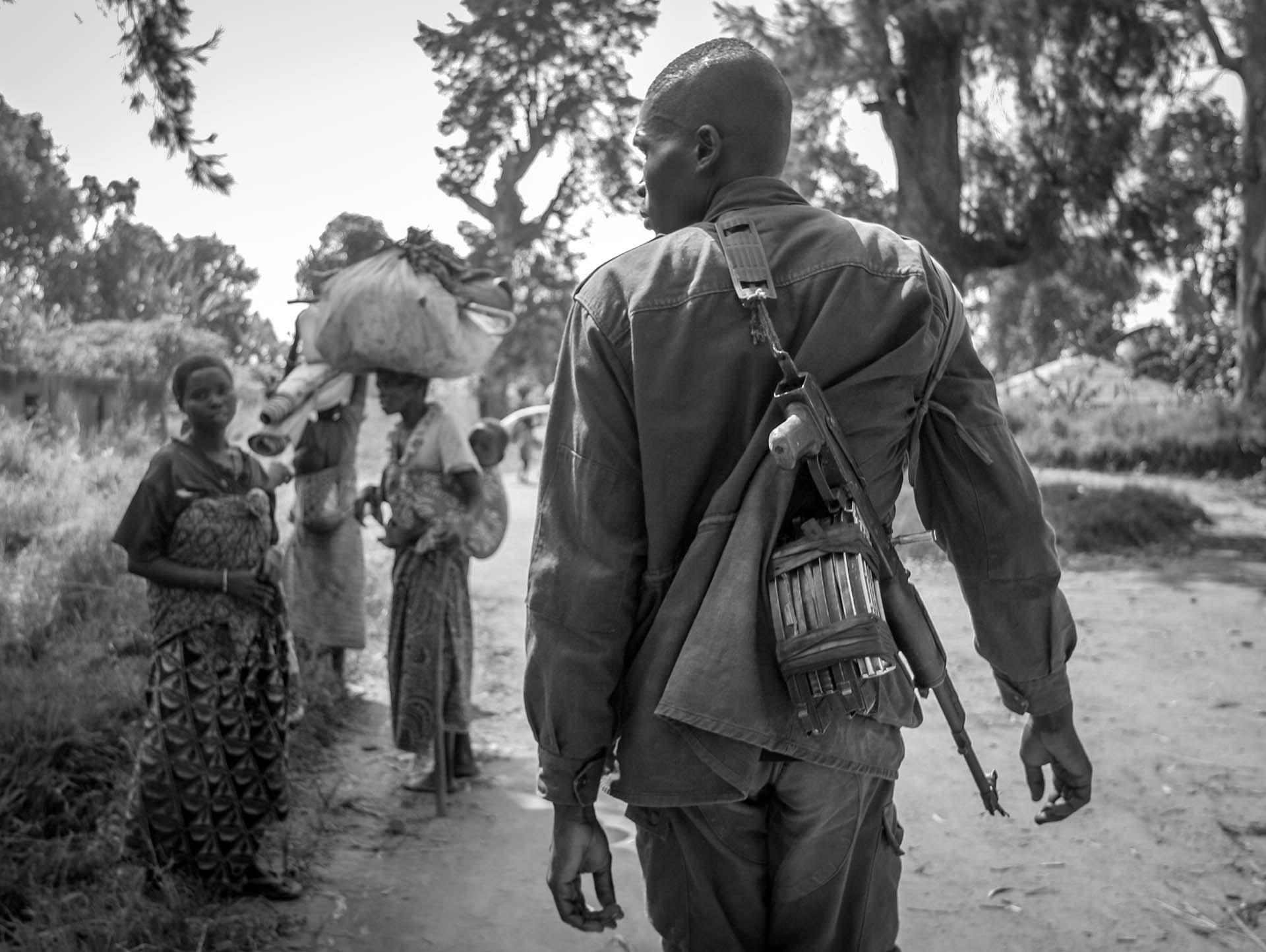
2 / 45
A solder roams along the path of IDPs (Internally displaced people) in the village of Gety, 60 km southwest of Bunia a regional capital of mineral-rich Ituri district in eastern DR Congo. Due to fighting between government forces and militia groups, tens of thousands were displaced in the area. Both the government and numerous militia groups were all blamed for terrorizing the local population.
A solder roams along the path of IDPs (Internally displaced people) in the village of...
READ ON
A solder roams along the path of IDPs (Internally displaced people) in the village of Gety, 60 km southwest of Bunia a regional capital of mineral-rich Ituri district in eastern DR Congo. Due to fighting between government forces and militia groups, tens of thousands were displaced in the area. Both the government and numerous militia groups were all blamed for terrorizing the local population.
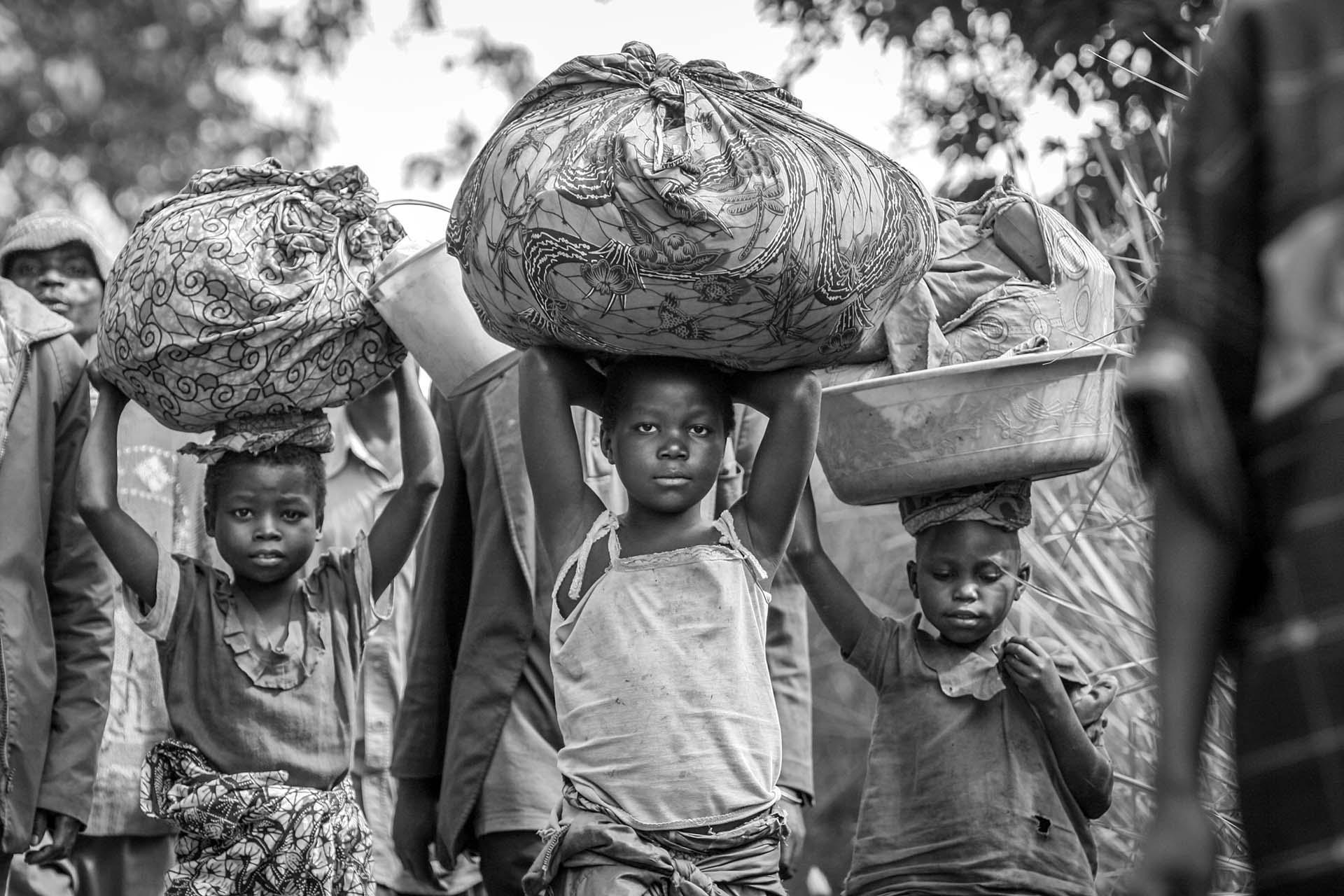
3 / 45
With all their worldly goods, Congolese, women and children, make a long journey to find a safe haven near the village of Gety in Ituri region.
With all their worldly goods, Congolese, women and children, make a long journey to...
READ ON
With all their worldly goods, Congolese, women and children, make a long journey to find a safe haven near the village of Gety in Ituri region.
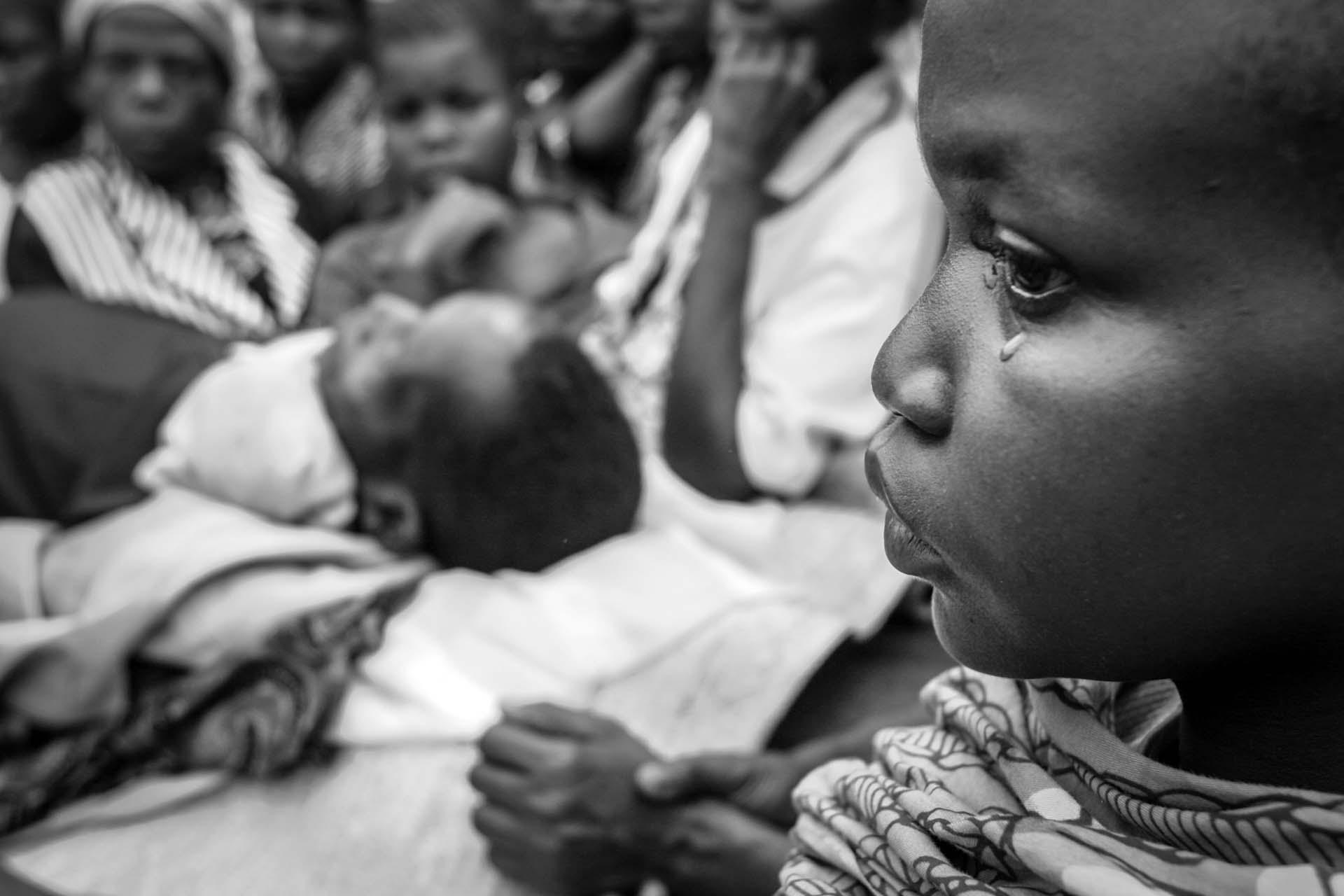
4 / 45
A girl grieves at the death of her father at an IDP camp.
A girl grieves at the death of her father at an IDP camp.
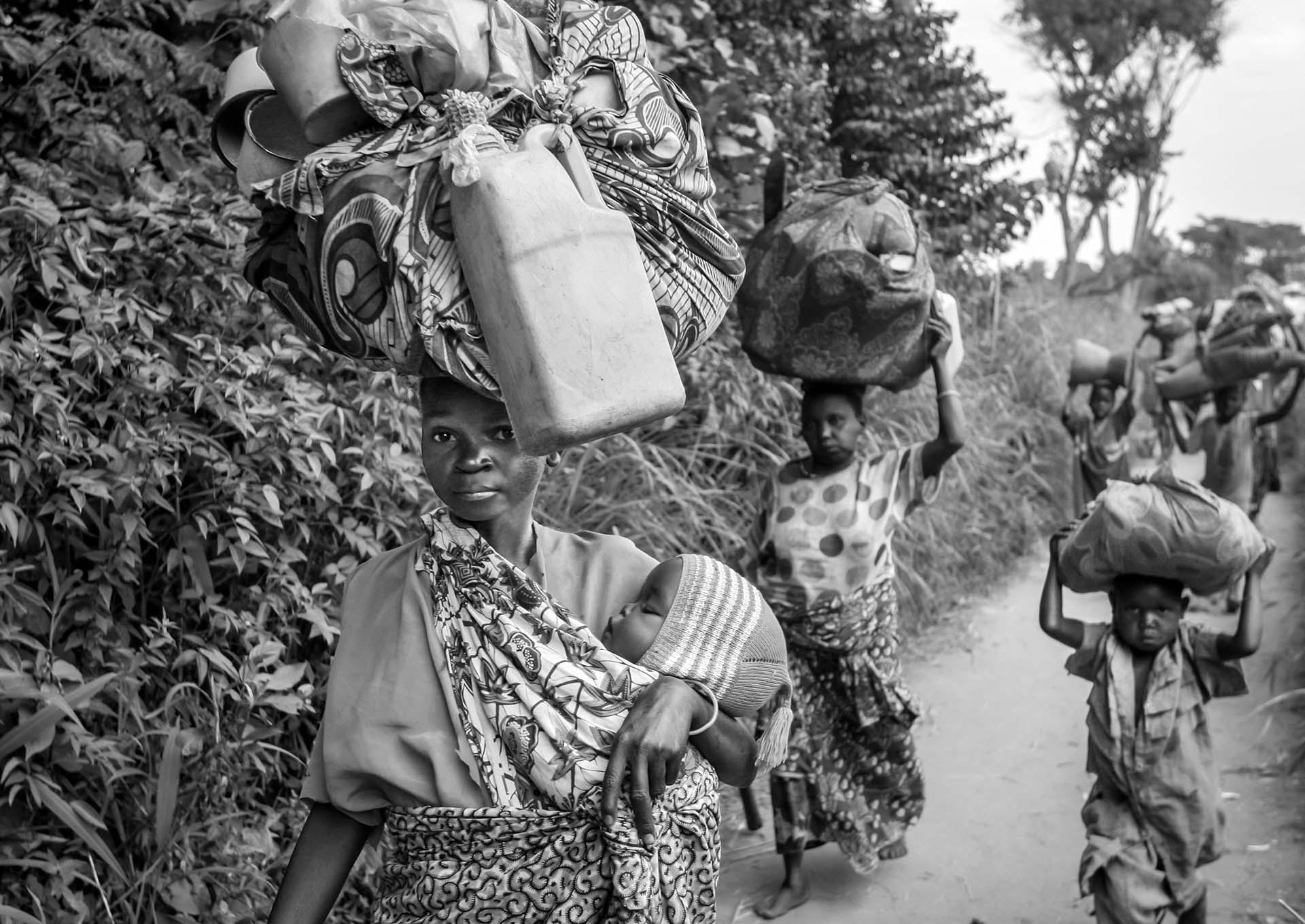
5 / 45
With all they can carry, Congolese IDPs make a long journey to find a safe haven near the village of Gety in mineral-rich Ituri region.
With all they can carry, Congolese IDPs make a long journey to find a safe haven near...
READ ON
With all they can carry, Congolese IDPs make a long journey to find a safe haven near the village of Gety in mineral-rich Ituri region.
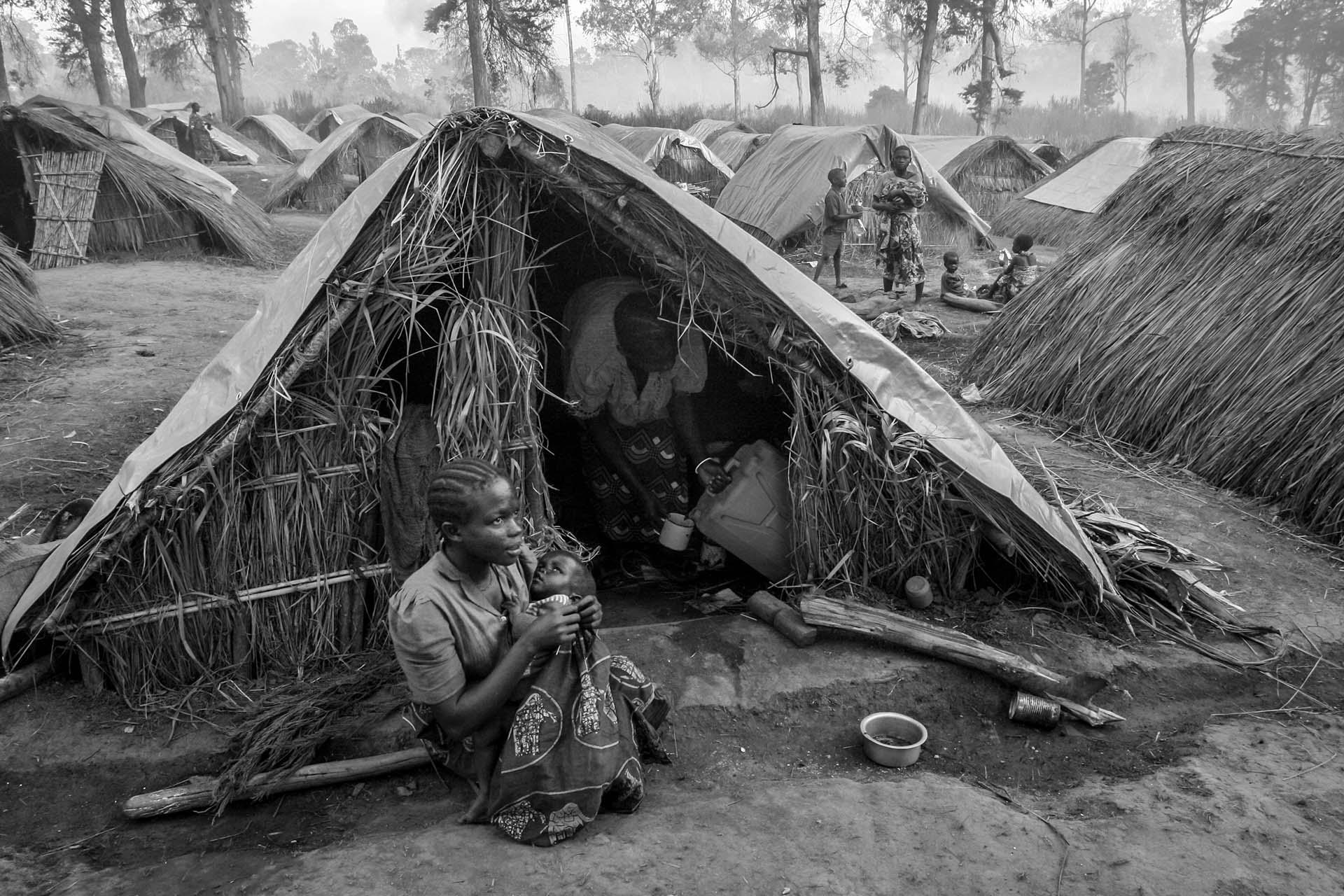
6 / 45
IDP camp sprang up quickly after crashes between armed groups and government soldiers in the Village of Gety, 60km southwest of Bunia, regional capital of mineral-rich Ituri region in eastern DR Congo.
IDP camp sprang up quickly after crashes between armed groups and government...
READ ON
IDP camp sprang up quickly after crashes between armed groups and government soldiers in the Village of Gety, 60km southwest of Bunia, regional capital of mineral-rich Ituri region in eastern DR Congo.
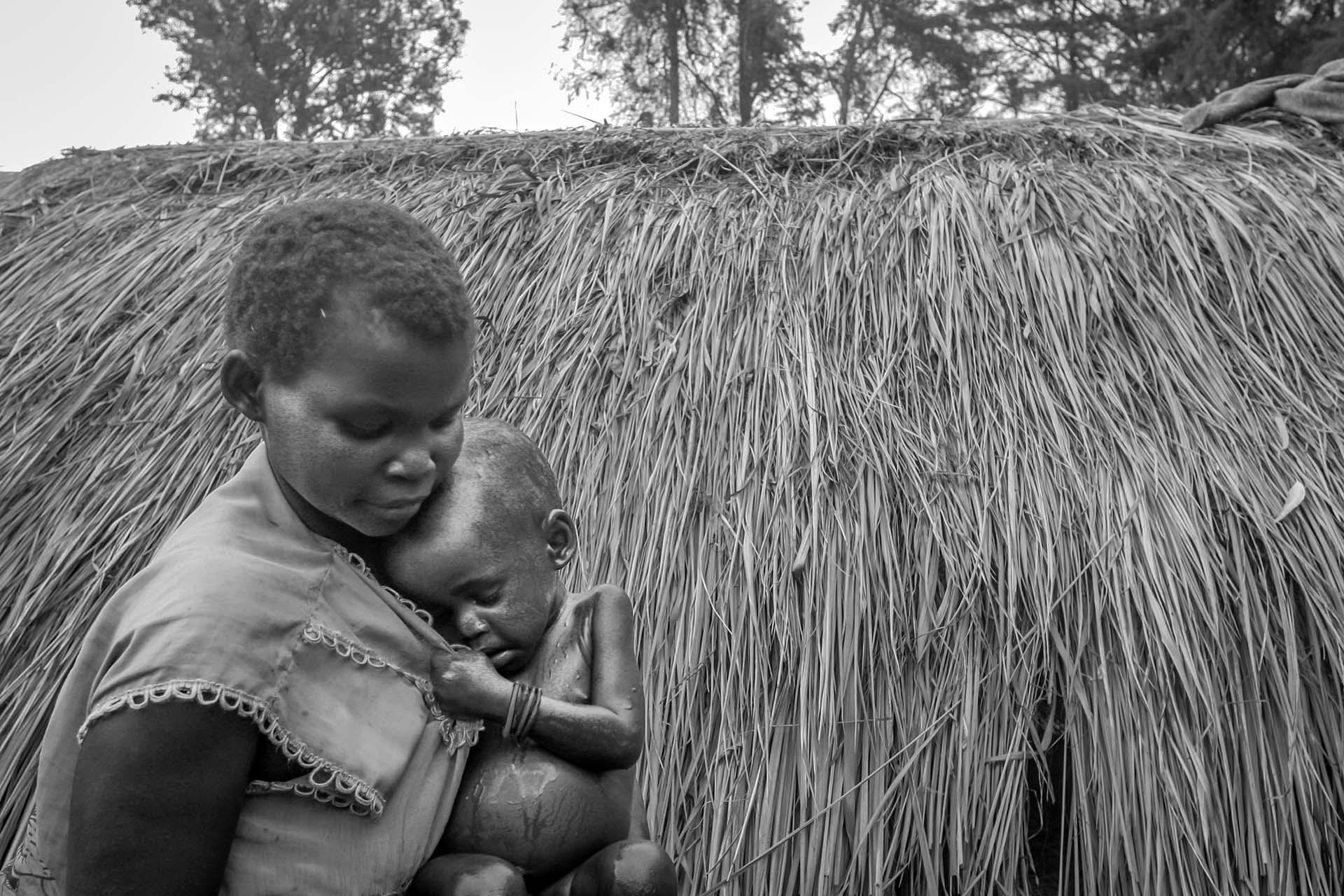
7 / 45
A mother tries to comfort her malnourished child at IDP camp in the village of Gety.
A mother tries to comfort her malnourished child at IDP camp in the village of Gety.
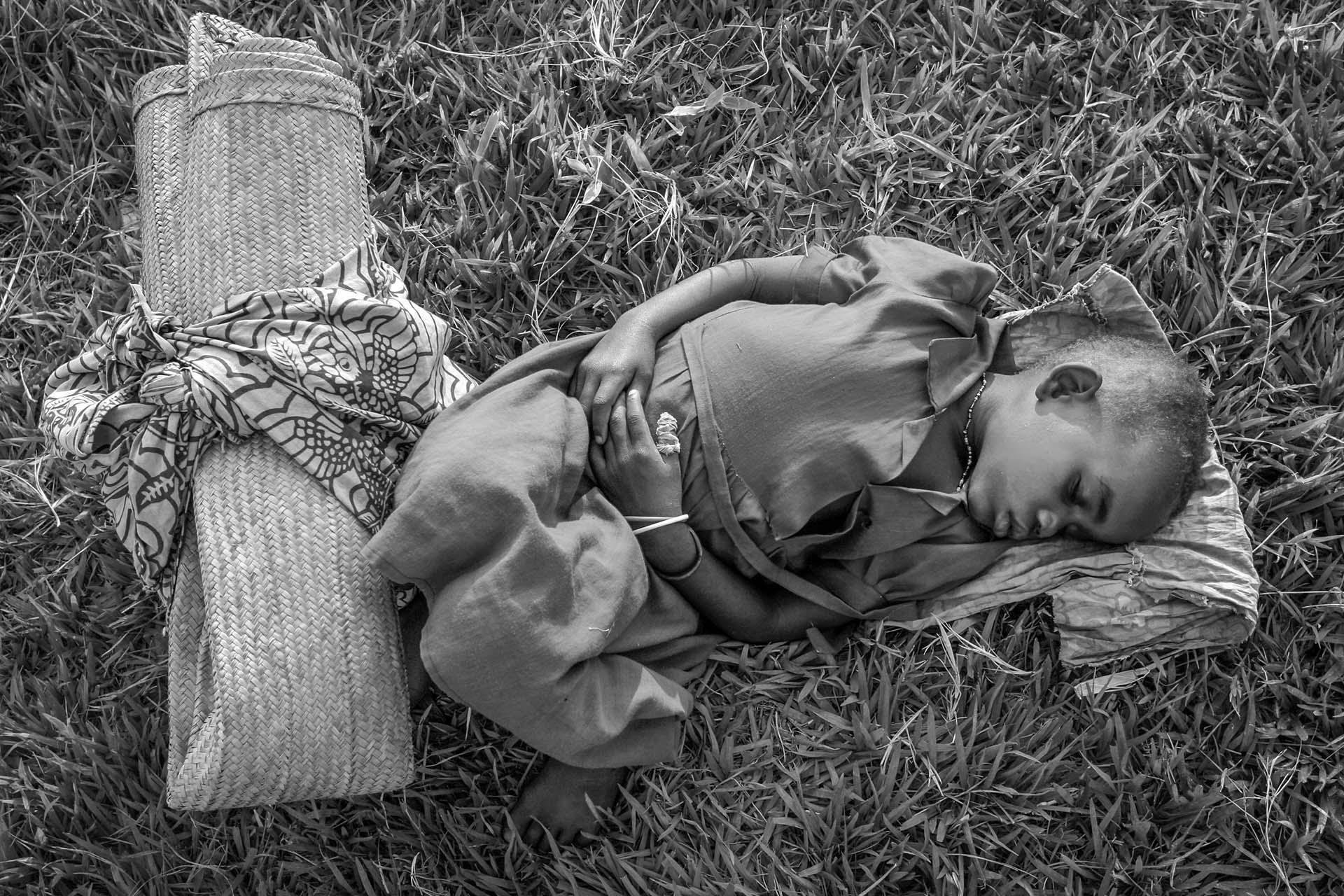
8 / 45
A girl rests after a long journey at a Catholic church in the village of Gety, 60 km southwest of Bunia, regional capital of Ituri region in eastern DR Congo. Fighting between government forces and militia groups, meant tens of thousands were displaced in the area.
A girl rests after a long journey at a Catholic church in the village of Gety, 60 km...
READ ON
A girl rests after a long journey at a Catholic church in the village of Gety, 60 km southwest of Bunia, regional capital of Ituri region in eastern DR Congo. Fighting between government forces and militia groups, meant tens of thousands were displaced in the area.
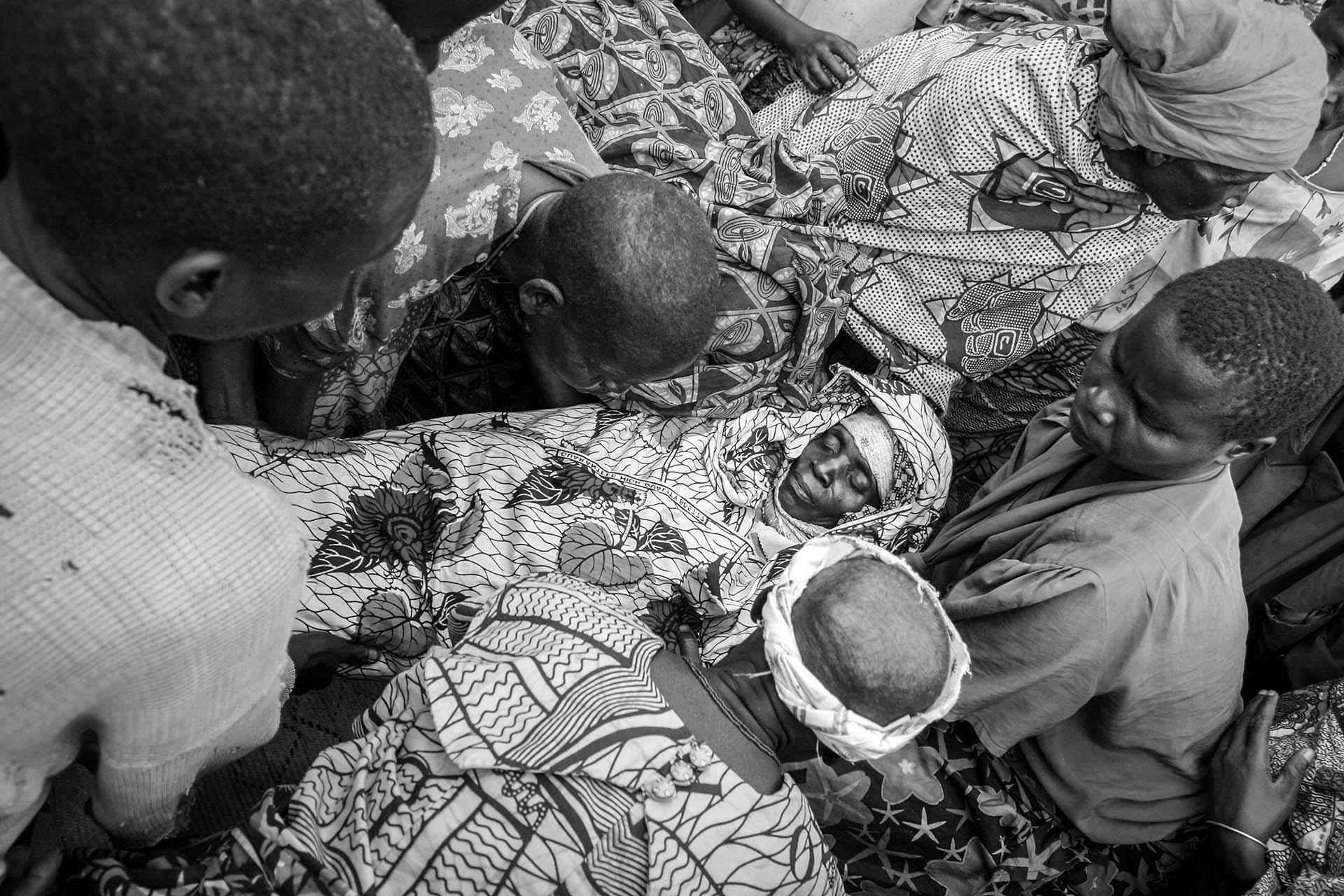
9 / 45
Lea Androsi is being carried into her grave in the village of Gety. She left 3 children and elderly mother behind. She died from acute diarrhea while in hiding in the bush with no access to clean water.
Lea Androsi is being carried into her grave in the village of Gety. She left 3 children...
READ ON
Lea Androsi is being carried into her grave in the village of Gety. She left 3 children and elderly mother behind. She died from acute diarrhea while in hiding in the bush with no access to clean water.
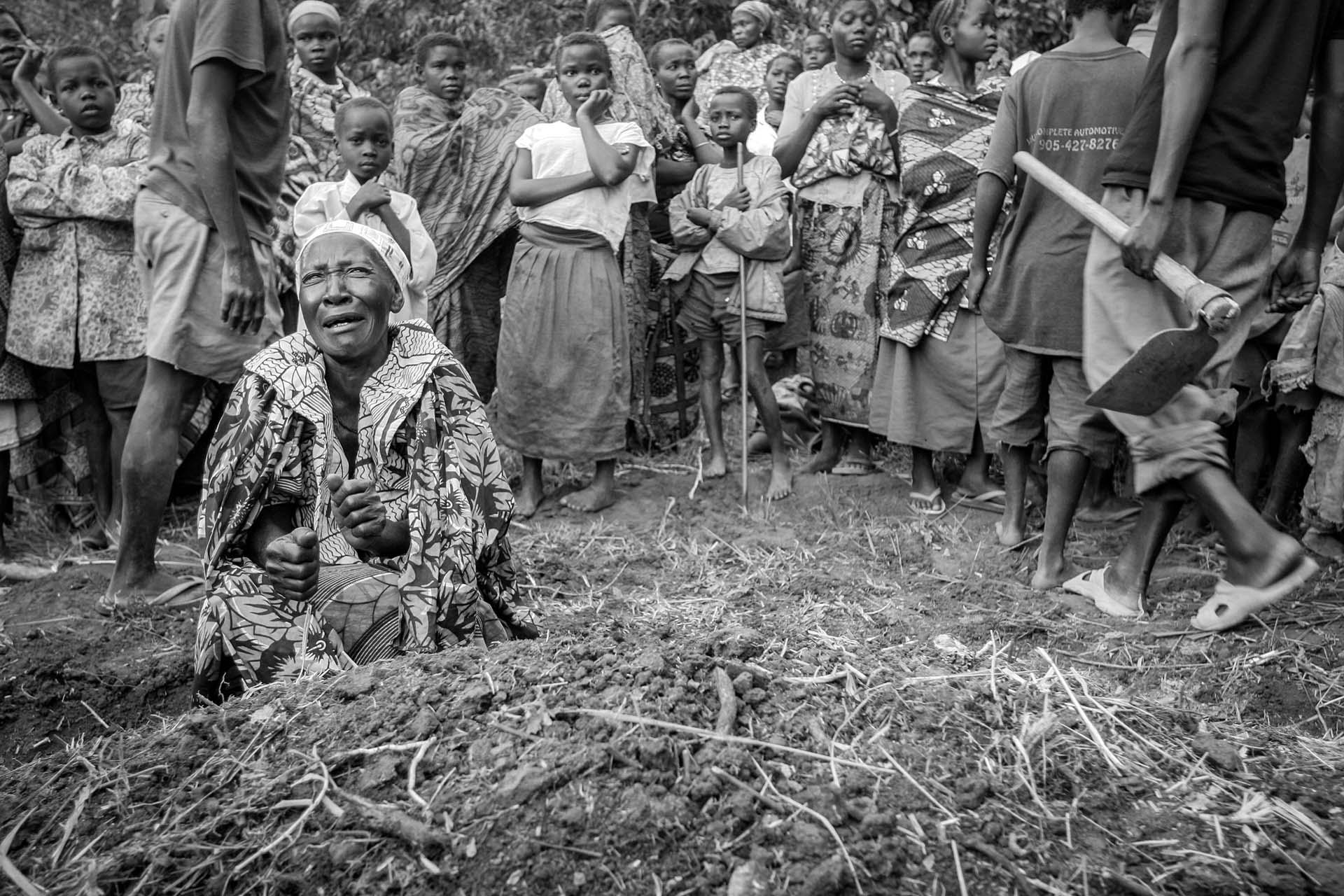
10 / 45
The Mother of Lea Androsi mourns for her daughter during her funeral in the village of Gety. She left 3 children after contracting acute watery diarrhea while her family were hiding from the fighting with no access to clean water in the bush.
The Mother of Lea Androsi mourns for her daughter during her funeral in the village of...
READ ON
The Mother of Lea Androsi mourns for her daughter during her funeral in the village of Gety. She left 3 children after contracting acute watery diarrhea while her family were hiding from the fighting with no access to clean water in the bush.
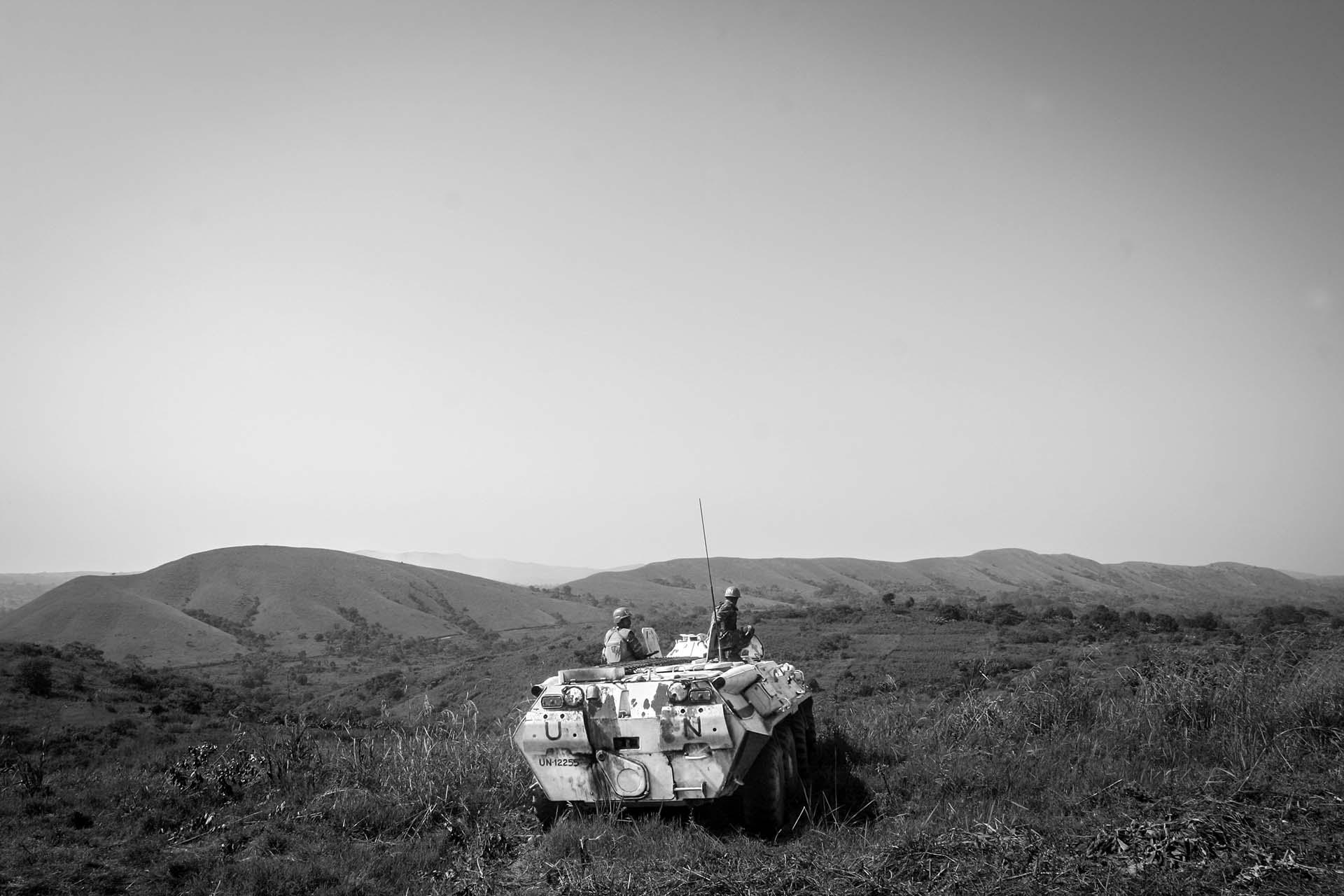
11 / 45
Bangladeshi UN peacekeepers ride an armored personnel carrier to the hilltop overlooking the village of Bavi, the scene of fighting between UN supported government troops and local insurgents.
Bangladeshi UN peacekeepers ride an armored personnel carrier to the hilltop...
READ ON
Bangladeshi UN peacekeepers ride an armored personnel carrier to the hilltop overlooking the village of Bavi, the scene of fighting between UN supported government troops and local insurgents.
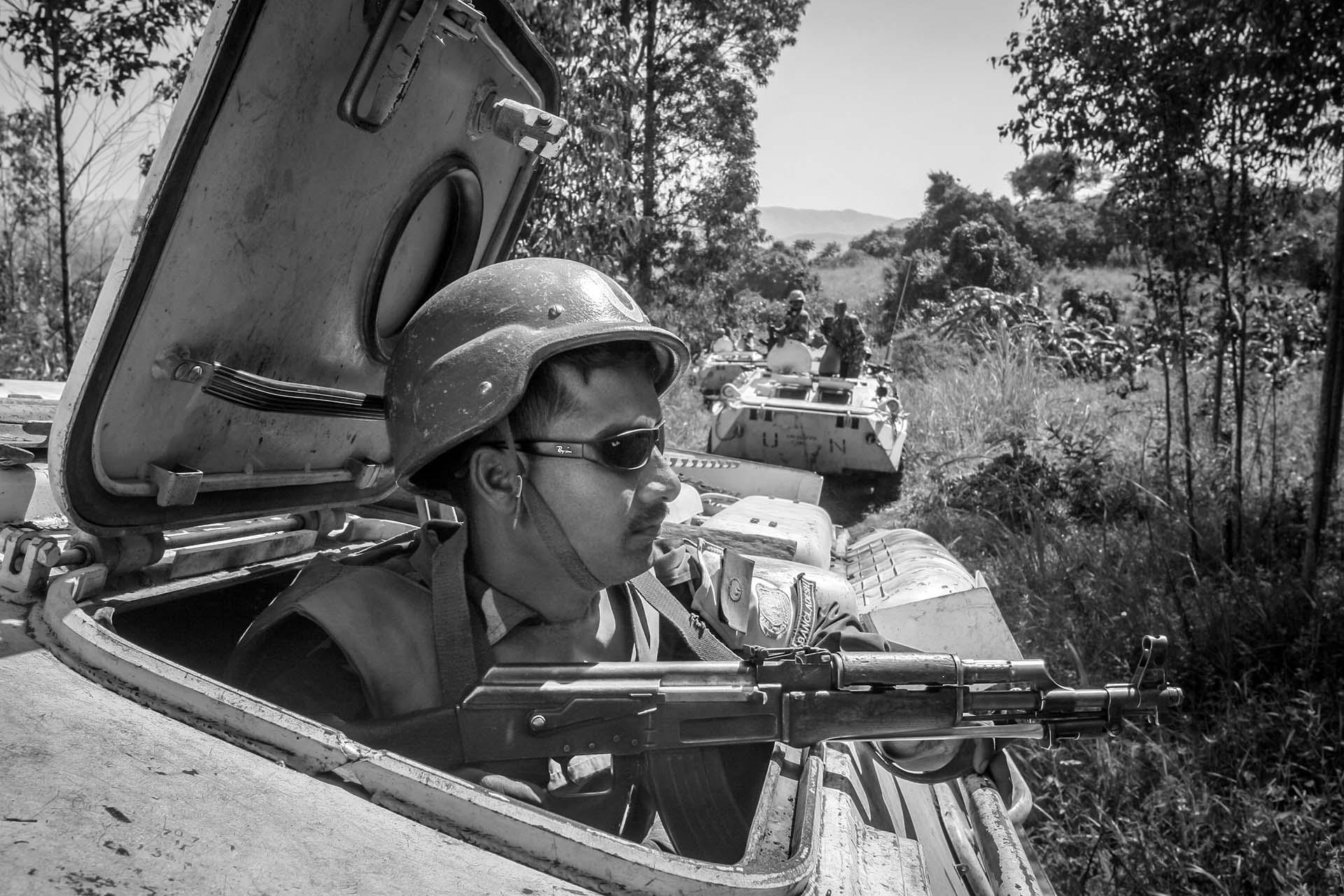
12 / 45
UN peacekeepers from Bangladesh patrol the village of Kaswara where after fighting between militia and government soldiers supported by UN.
UN peacekeepers from Bangladesh patrol the village of Kaswara where after fighting...
READ ON
UN peacekeepers from Bangladesh patrol the village of Kaswara where after fighting between militia and government soldiers supported by UN.
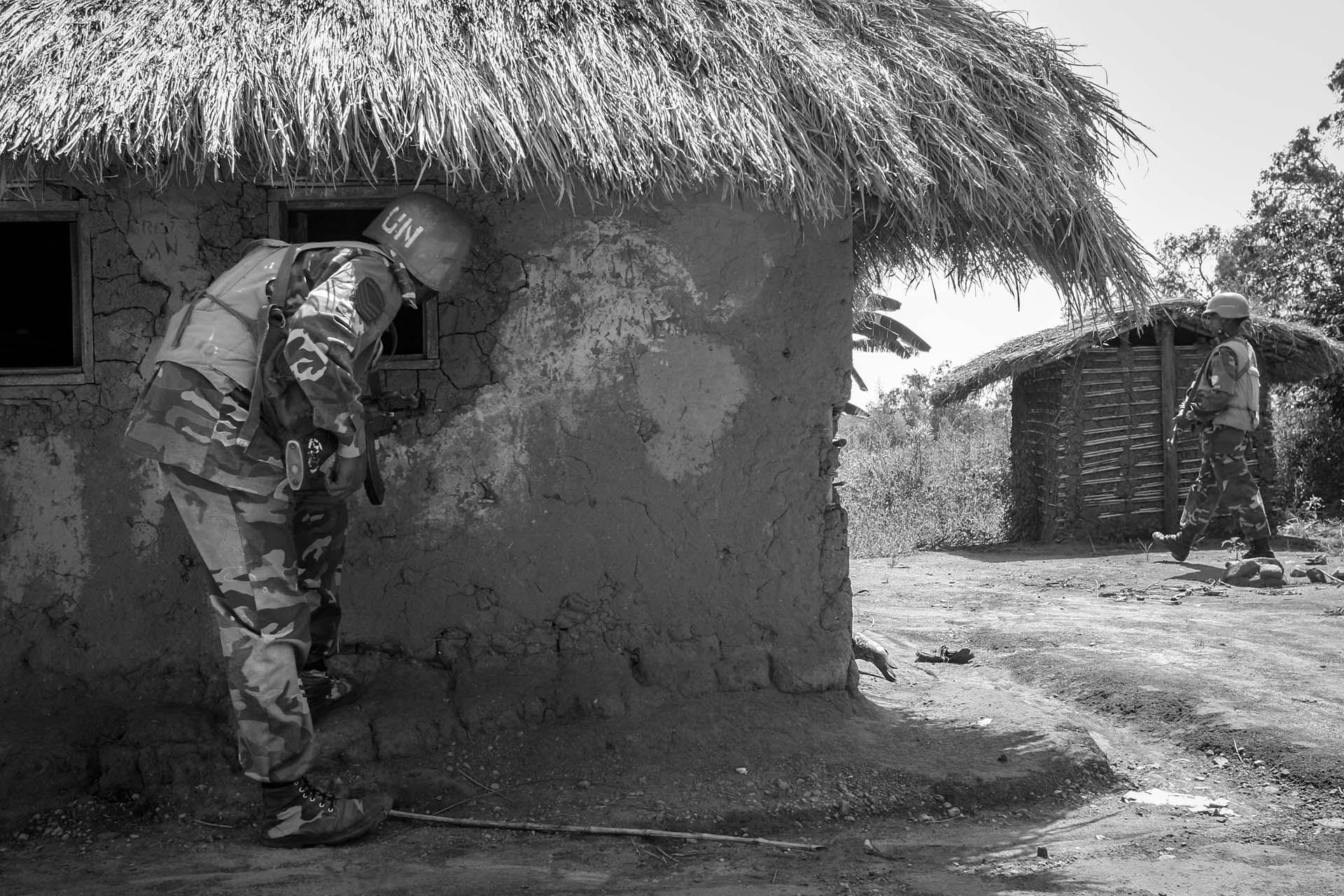
13 / 45
A UN peacekeeper from Bangladesh conduct a foot patrol in the village of Kaswara where there was fighting between militia and government soldiers supported by UN.
A UN peacekeeper from Bangladesh conduct a foot patrol in the village of Kaswara where...
READ ON
A UN peacekeeper from Bangladesh conduct a foot patrol in the village of Kaswara where there was fighting between militia and government soldiers supported by UN.
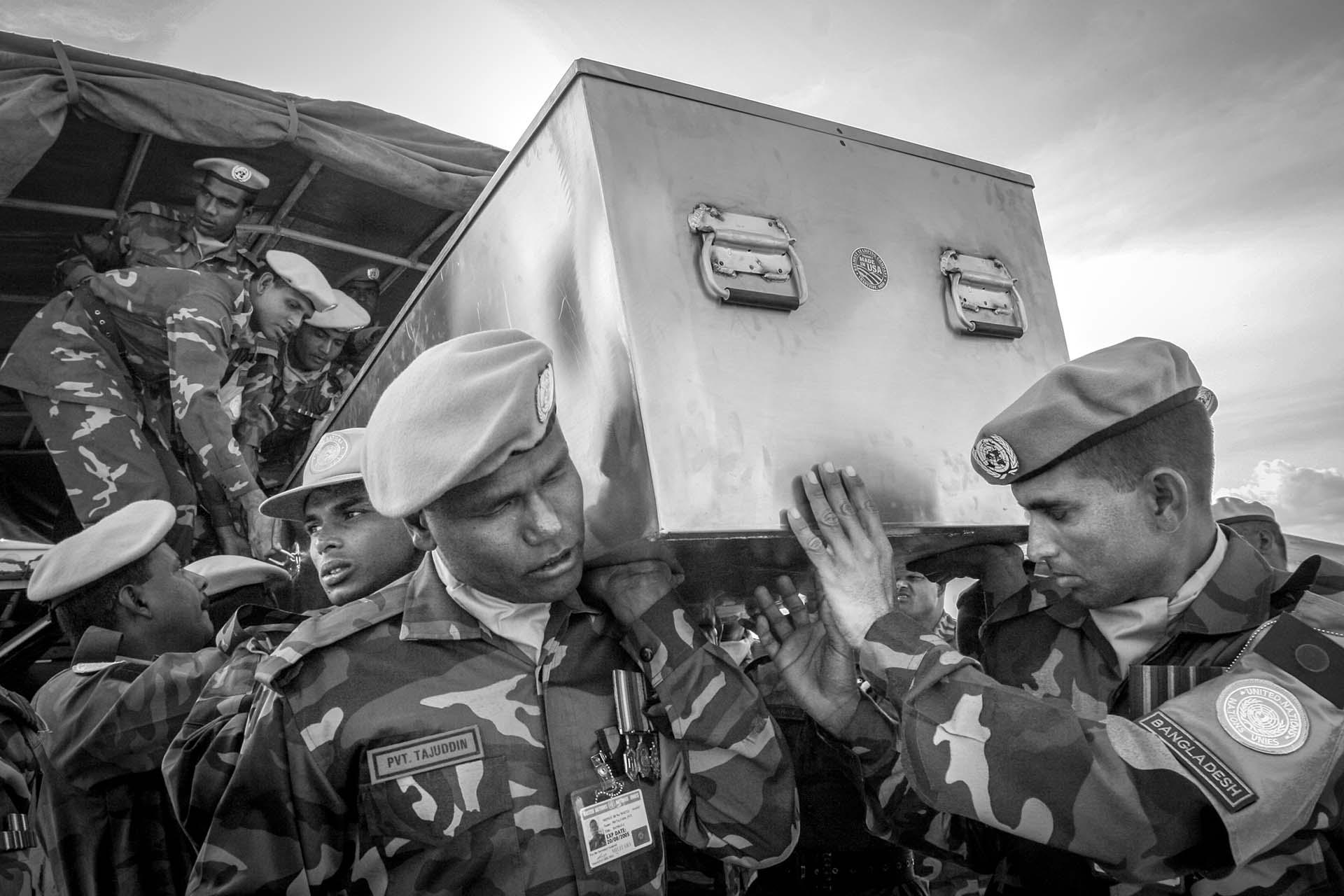
14 / 45
A body of Bangladeshi soldier killed in an ambush near Bunia by a militia group is carried out of a truck to be returned to his home country.
A body of Bangladeshi soldier killed in an ambush near Bunia by a militia group...
READ ON
A body of Bangladeshi soldier killed in an ambush near Bunia by a militia group is carried out of a truck to be returned to his home country.
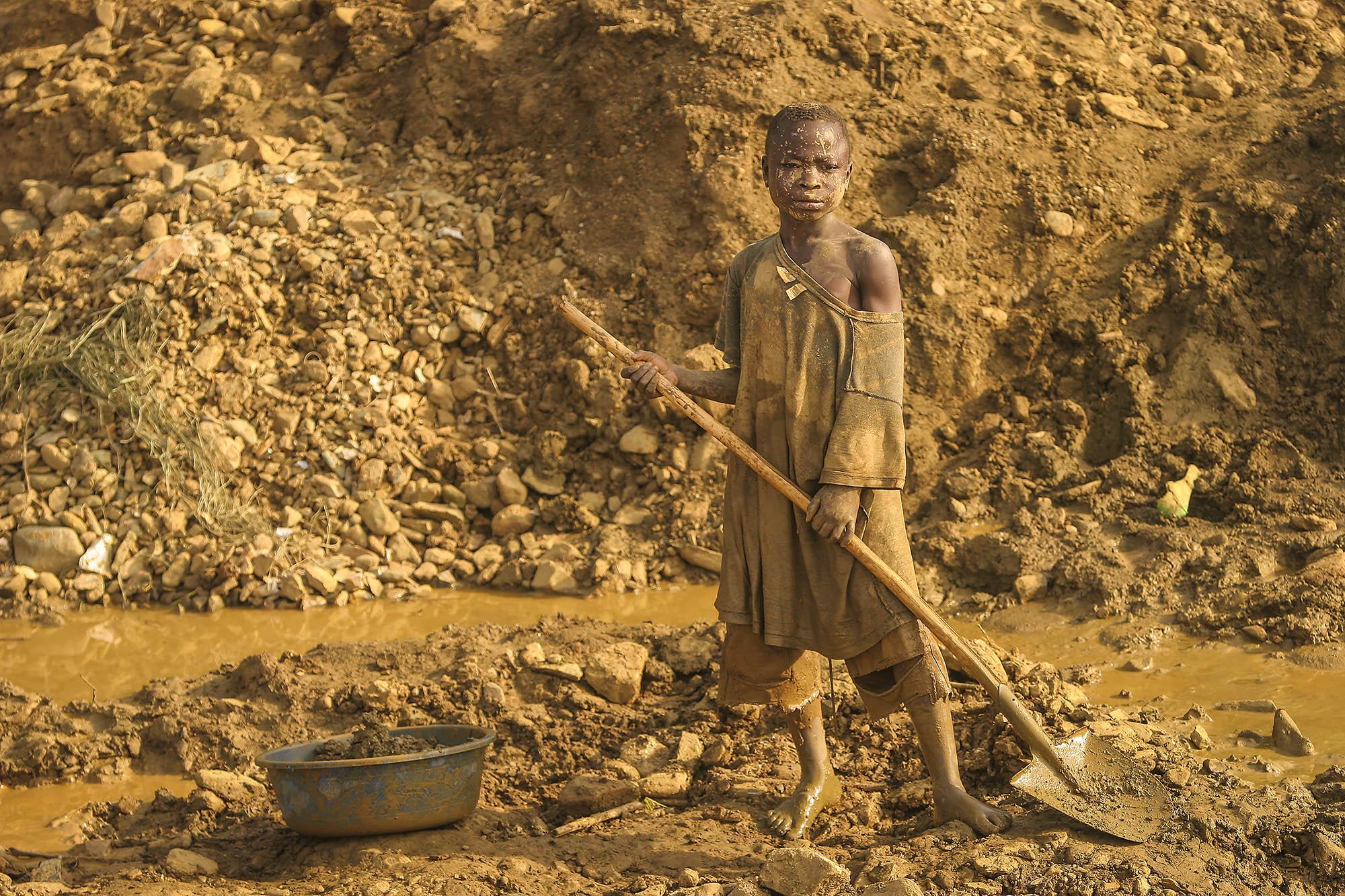
15 / 45
The DRC’s rich mineral resources have fueled a seemingly endless cycle of conflicts, by providing easy ways to finance the numerous armed groups.
Eric Tanguda doesn't remember his age. He came to this gold mine in Montgbawalu, Ituri district in the eastern part of Democratic Republic of Congo to help his family to make ends meet. The troubled and war-torn northeastern region of the country is rich in gold.
The DRC’s rich mineral resources have fueled a seemingly endless cycle of...
READ ON
The DRC’s rich mineral resources have fueled a seemingly endless cycle of conflicts, by providing easy ways to finance the numerous armed groups. Eric Tanguda doesn't remember his age. He came to this gold mine in Montgbawalu, Ituri district in the eastern part of Democratic Republic of Congo to help his family to make ends meet. The troubled and war-torn northeastern region of the country is rich in gold.
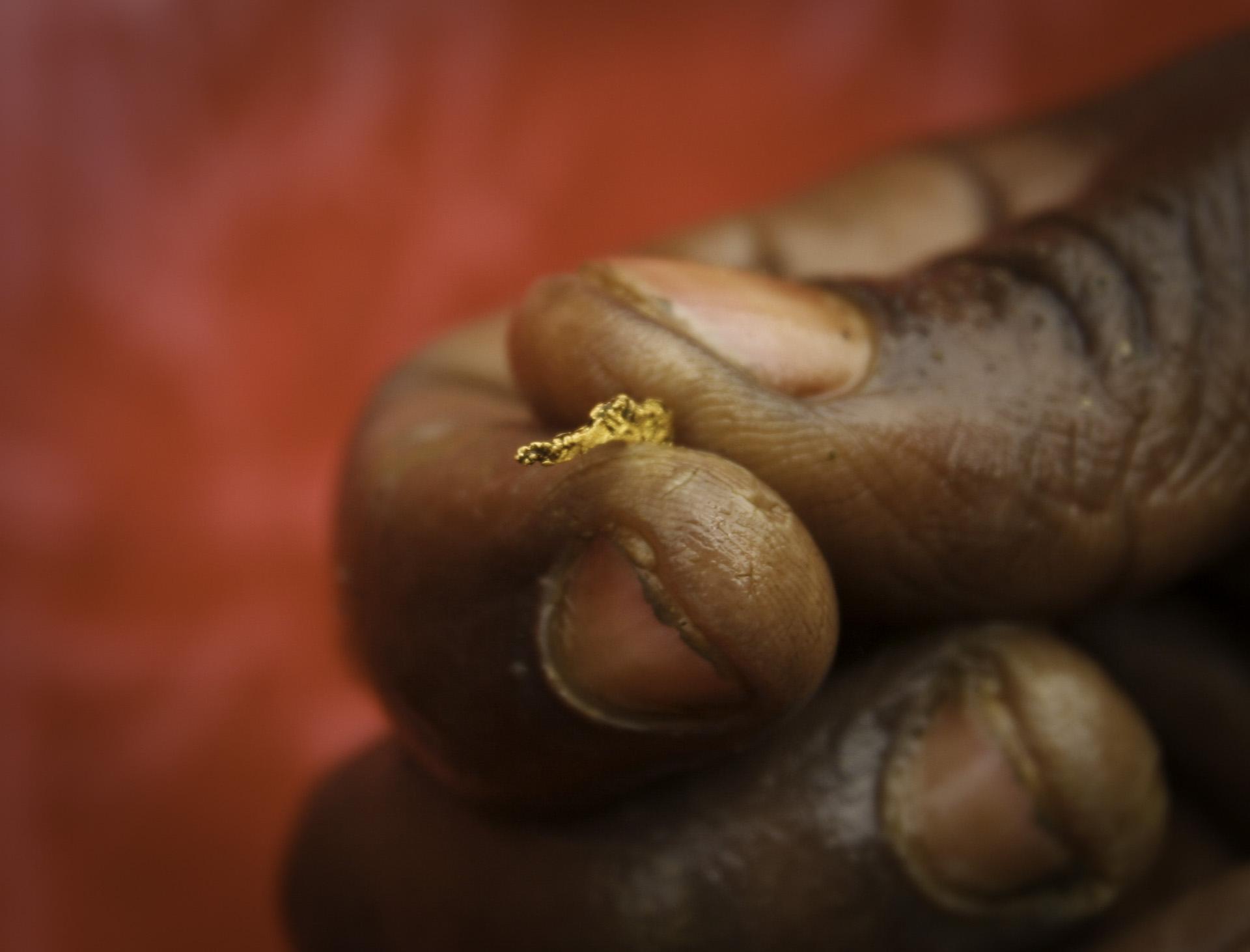
16 / 45
A tiny nugget of gold found at an artisanal gold mine in Montgbawalu. A find like this is few and far in between. Most workers trade their labor for a few buckets of mud from the mines, hoping to find enough flakes of the metal to feed their families.
A tiny nugget of gold found at an artisanal gold mine in Montgbawalu. A find like...
READ ON
A tiny nugget of gold found at an artisanal gold mine in Montgbawalu. A find like this is few and far in between. Most workers trade their labor for a few buckets of mud from the mines, hoping to find enough flakes of the metal to feed their families.
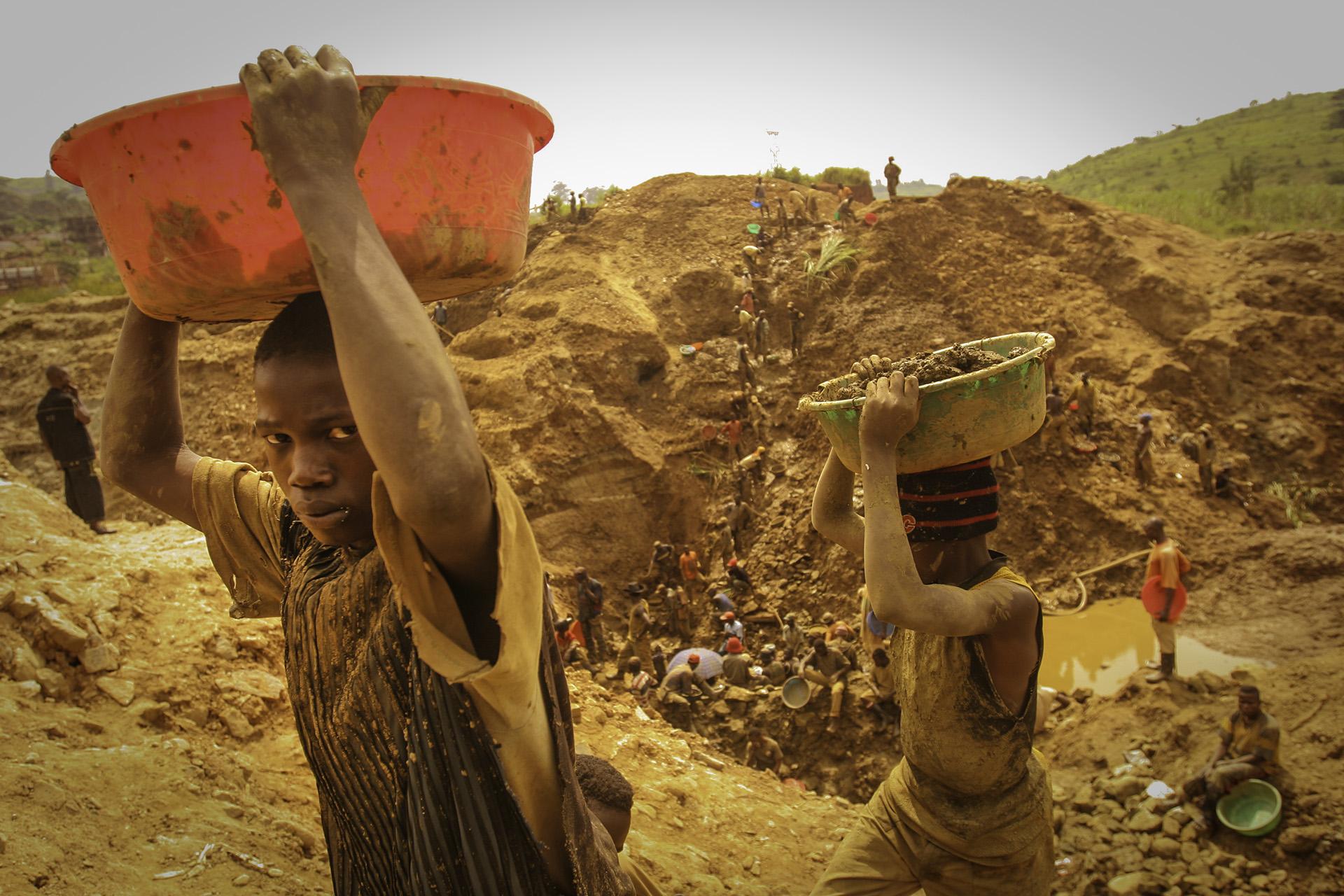
17 / 45
Many working at the gold mines in Ituri are children.
Many working at the gold mines in Ituri are children.
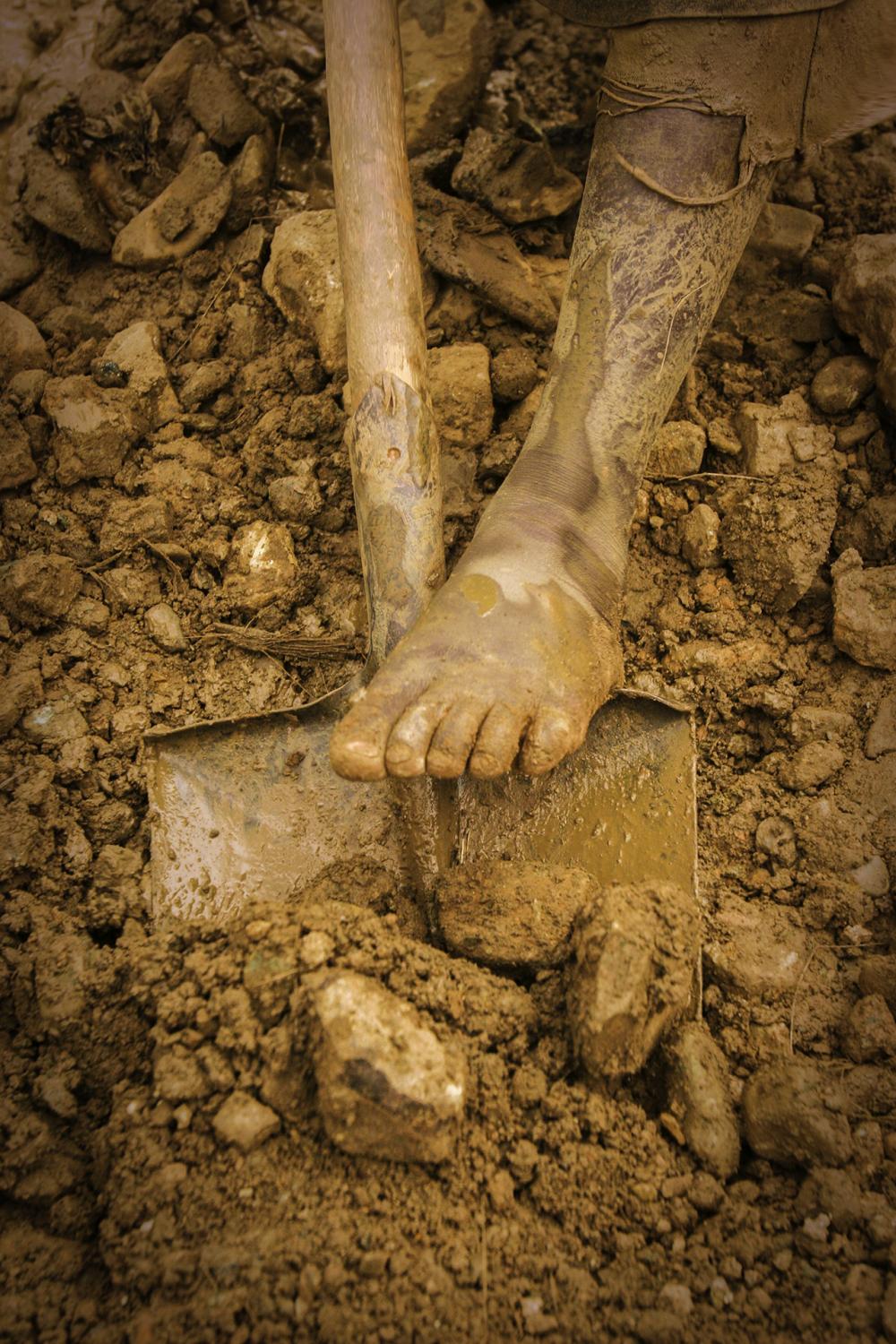
18 / 45
On hands and knees, mud and rocks is processed. Hardly any machinery is used to extract the gold in in most DR Congo mines.
On hands and knees, mud and rocks is processed. Hardly any machinery is used to extract...
READ ON
On hands and knees, mud and rocks is processed. Hardly any machinery is used to extract the gold in in most DR Congo mines.
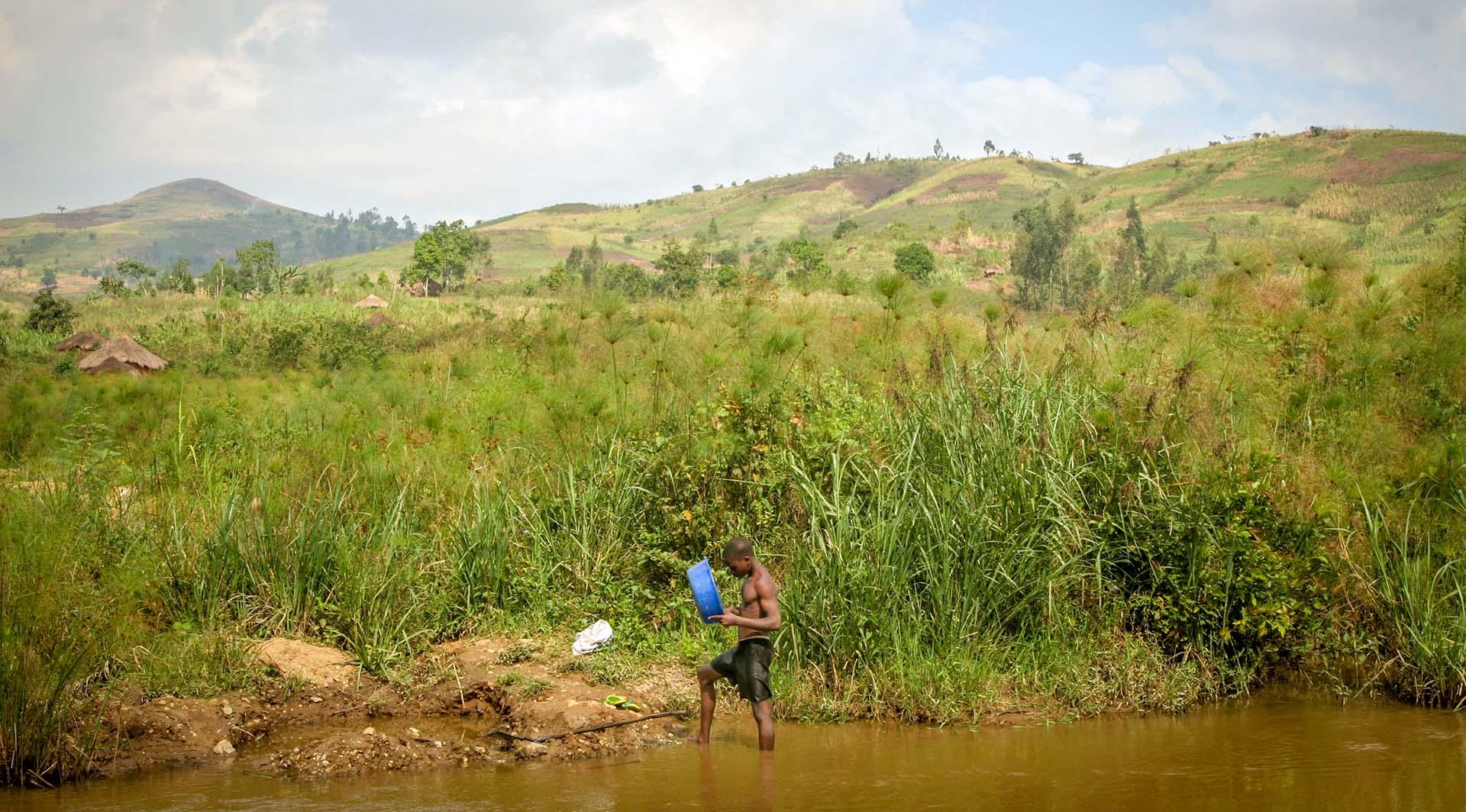
19 / 45
A man pans for gold in Iga-Barriere.
A man pans for gold in Iga-Barriere.
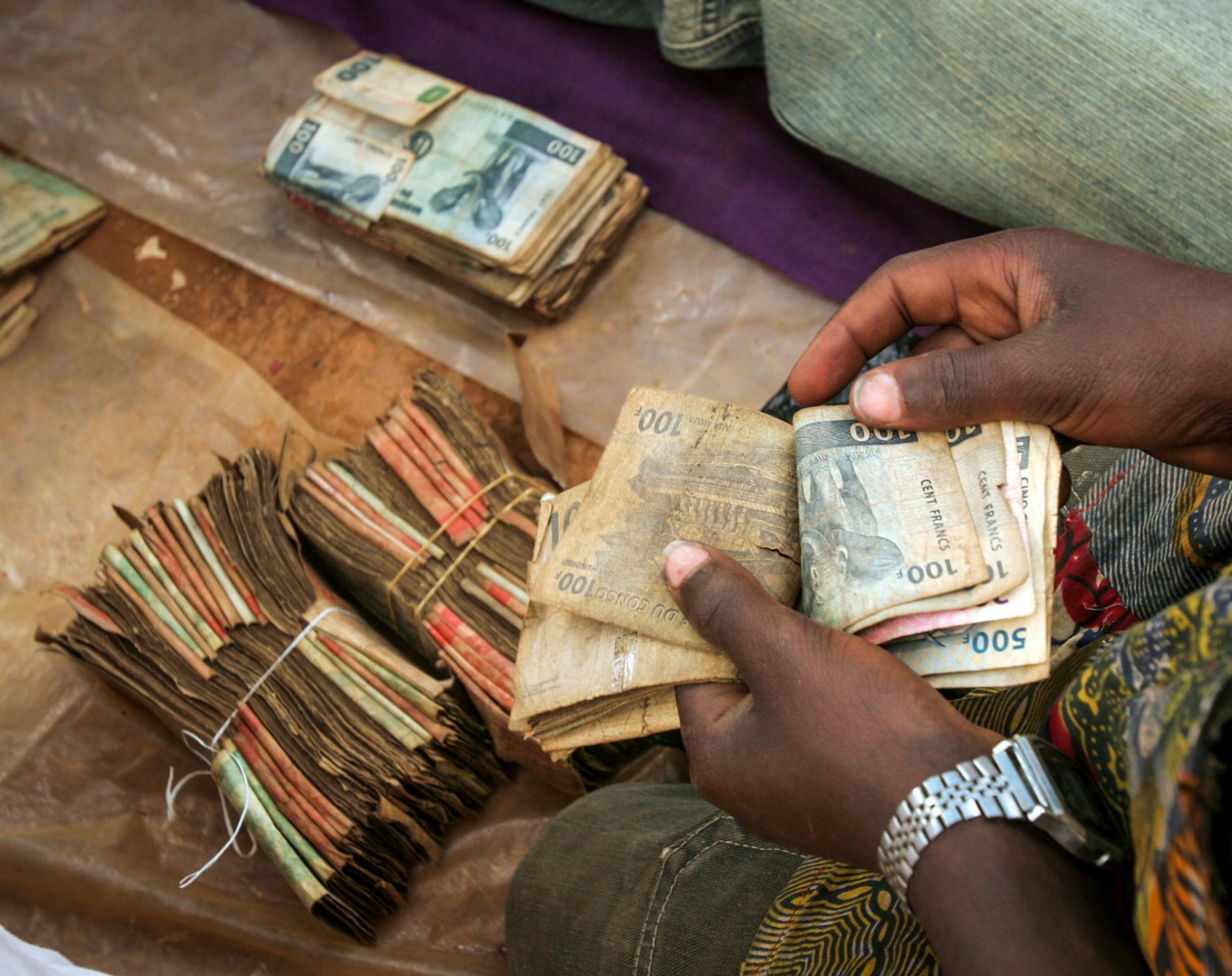
20 / 45
Money changing hands at a busy gold market in Iga-Barriere in Ituri. Most of the gold is smuggled to Uganda and Rwanda then onto the world market.
Money changing hands at a busy gold market in Iga-Barriere in Ituri. Most of the gold...
READ ON
Money changing hands at a busy gold market in Iga-Barriere in Ituri. Most of the gold is smuggled to Uganda and Rwanda then onto the world market.
Historic Election
Millions from across Democratic Republic of Congo, the vast Central African Country spanning an area the size of Western Europe, cast ballots for the first time in their lives on July 30, 2006, hoping it will finally end more than 40 years of civil war and dictatorships. Joseph Kabila, 35, and the outgoing president of transitional government faced his vice president of the same government, Jean Pierre Bemba, the only strong rival among more than 30 Presidential candidates.
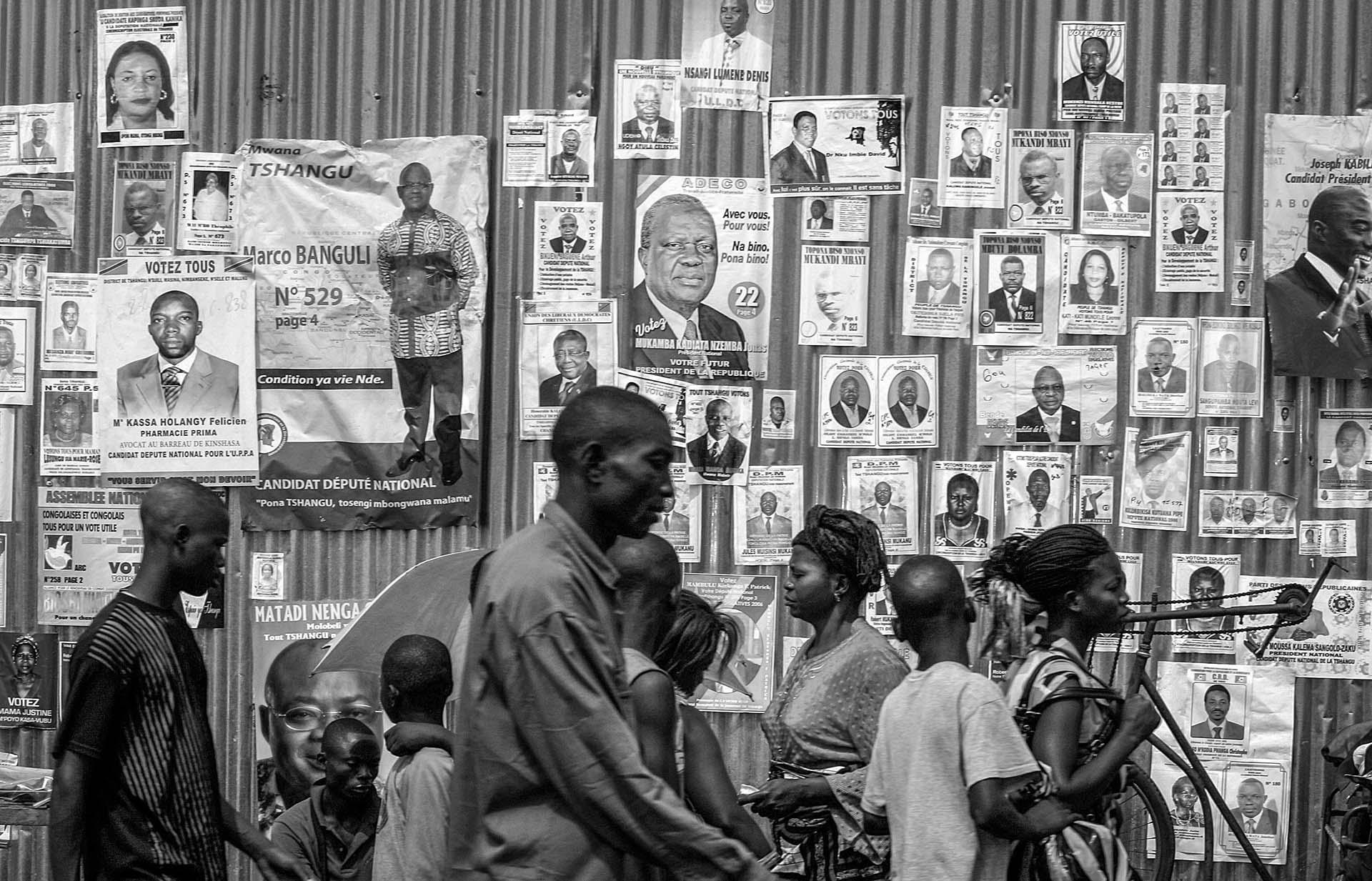
22 / 45
Posters of candidates for presidential and national elections occupy every inch of the wall in Kinshasa, July 25, 2006. There are 32 presidential candidate alone. As the presidential and national election draw near, the mood in the capital became tense. The war-torn Central African republic last had elections more than 40 years previously.
Posters of candidates for presidential and national elections occupy every inch of the...
READ ON
Posters of candidates for presidential and national elections occupy every inch of the wall in Kinshasa, July 25, 2006. There are 32 presidential candidate alone. As the presidential and national election draw near, the mood in the capital became tense. The war-torn Central African republic last had elections more than 40 years previously.
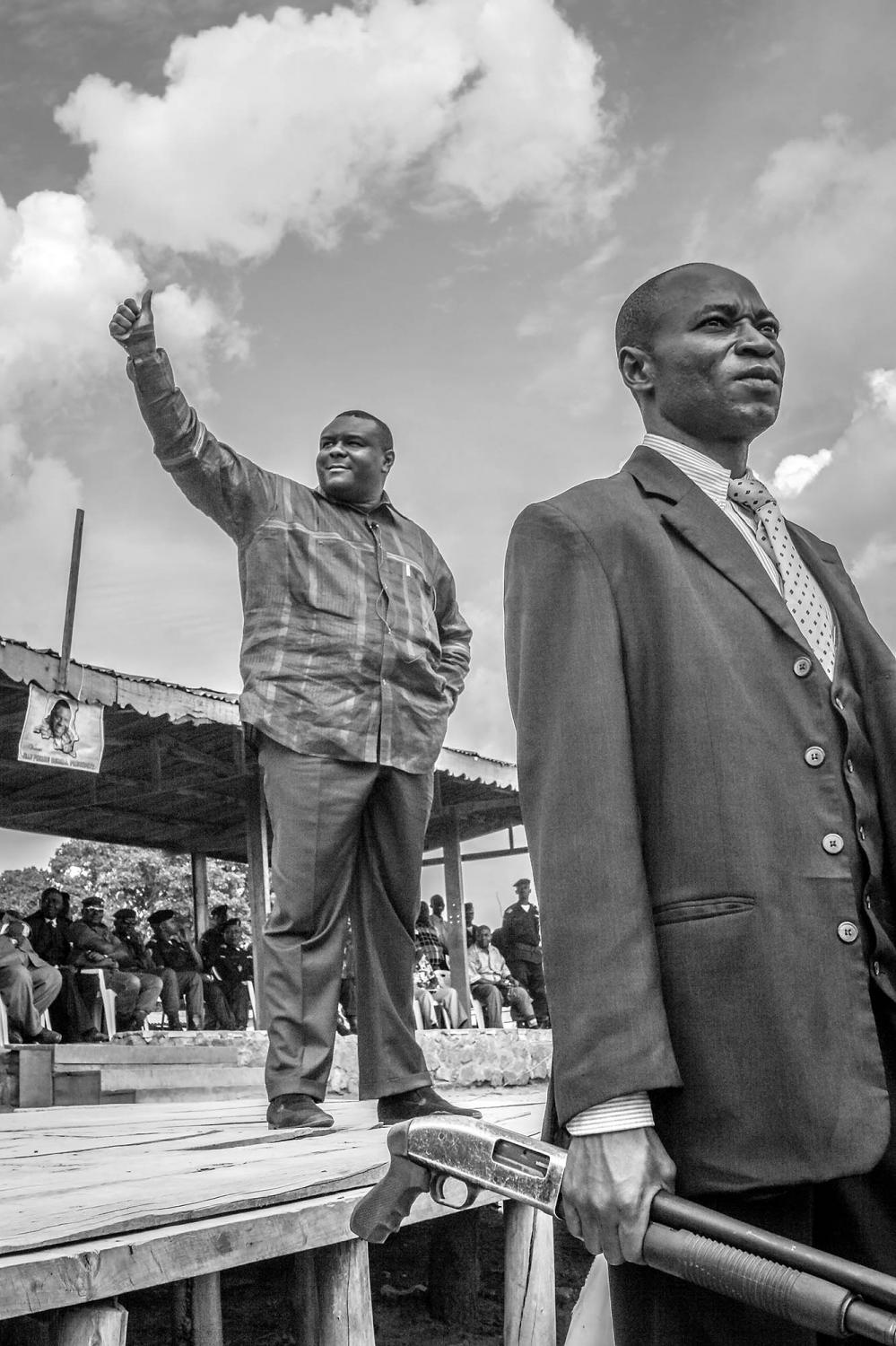
23 / 45
Surrounded by armed bodyguards, Jean Pierre Bemba, presidential candidate, addresses the crowd. In 2016, after losing his bid for the presidency, he was convicted and sentenced to 18 years in prison. However he was released after shocking reversal of his conviction by the ICC Appeals Chamber in 2018.
Surrounded by armed bodyguards, Jean Pierre Bemba, presidential candidate,...
READ ON
Surrounded by armed bodyguards, Jean Pierre Bemba, presidential candidate, addresses the crowd. In 2016, after losing his bid for the presidency, he was convicted and sentenced to 18 years in prison. However he was released after shocking reversal of his conviction by the ICC Appeals Chamber in 2018.
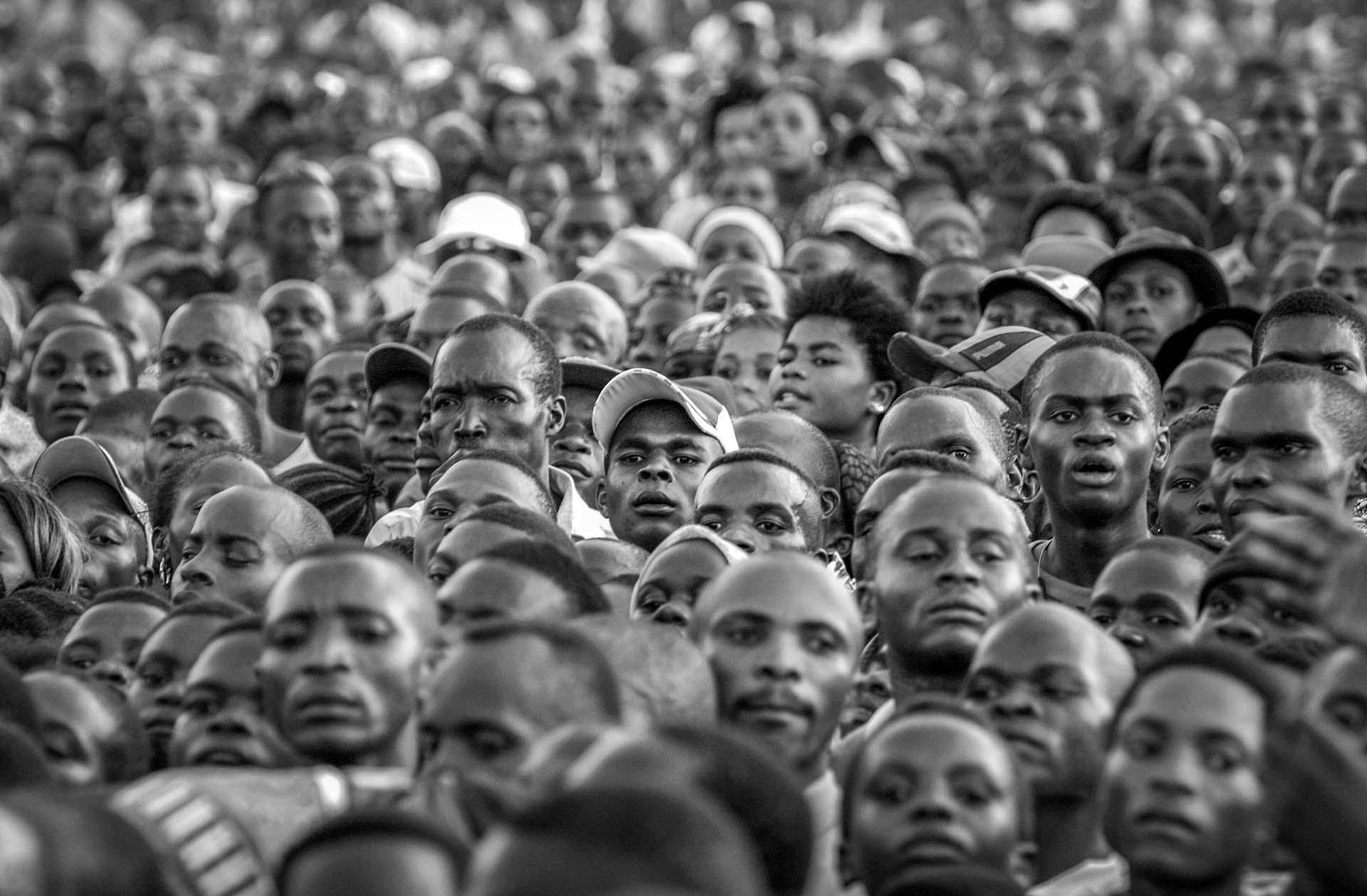
24 / 45
The crowd gather to listen to Jean Pierre Bemba, former warlord, then vice president and presidential candidate, appeals to the crowd in Bunia, the capital of Ituri region in Eastern DR Congo.
The crowd gather to listen to Jean Pierre Bemba, former warlord, then vice...
READ ON
The crowd gather to listen to Jean Pierre Bemba, former warlord, then vice president and presidential candidate, appeals to the crowd in Bunia, the capital of Ituri region in Eastern DR Congo.
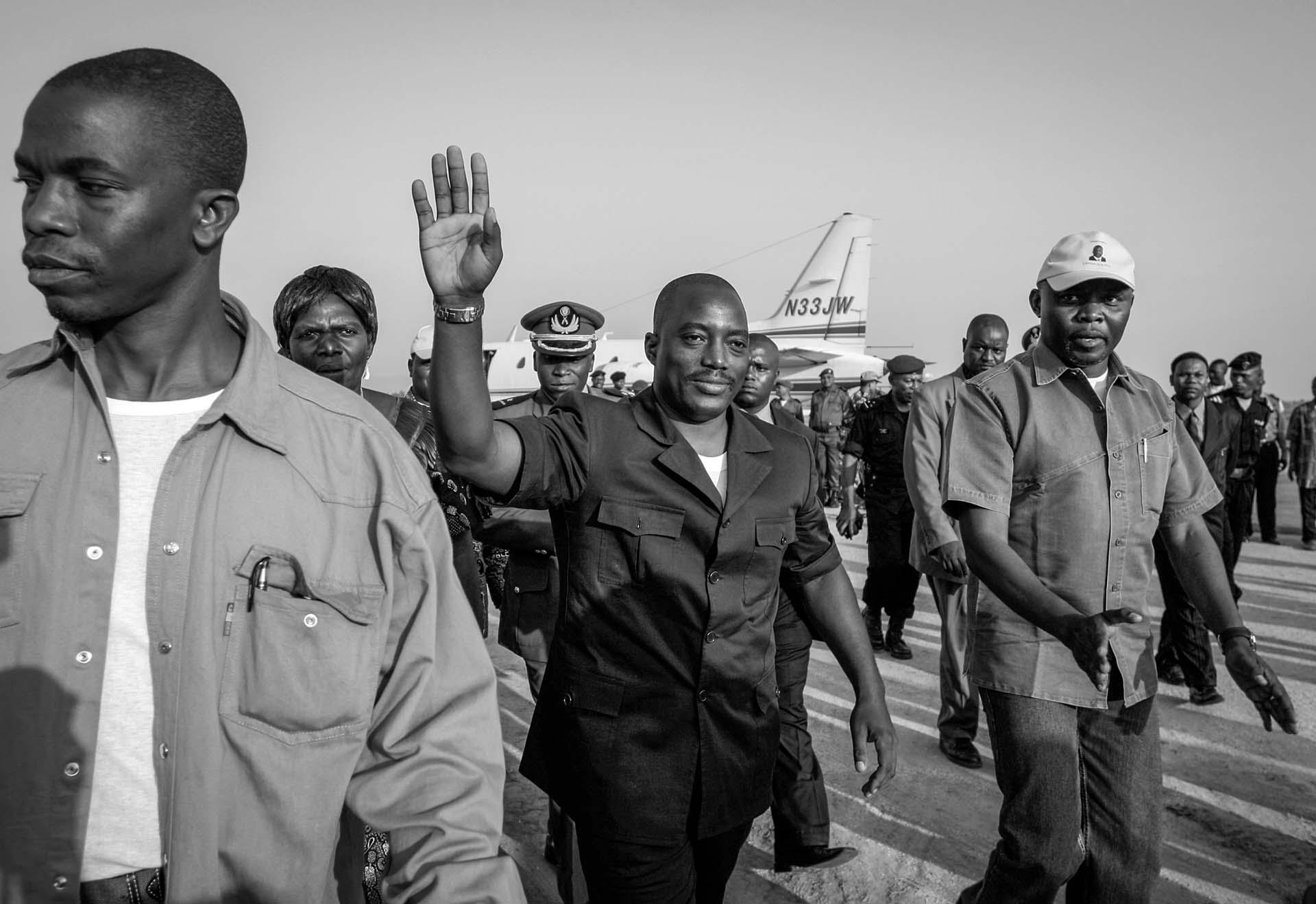
25 / 45
Joseph Kabila greets his supporters at Bunia airport July 12, 2006. The war-torn country had not had a national for election more than 40 years ago. Kabila retained his presidency, again in 2011. He attempted but failed to amend constitution so he can run for a 3rd term.
Joseph Kabila greets his supporters at Bunia airport July 12, 2006. The war-torn...
READ ON
Joseph Kabila greets his supporters at Bunia airport July 12, 2006. The war-torn country had not had a national for election more than 40 years ago. Kabila retained his presidency, again in 2011. He attempted but failed to amend constitution so he can run for a 3rd term.
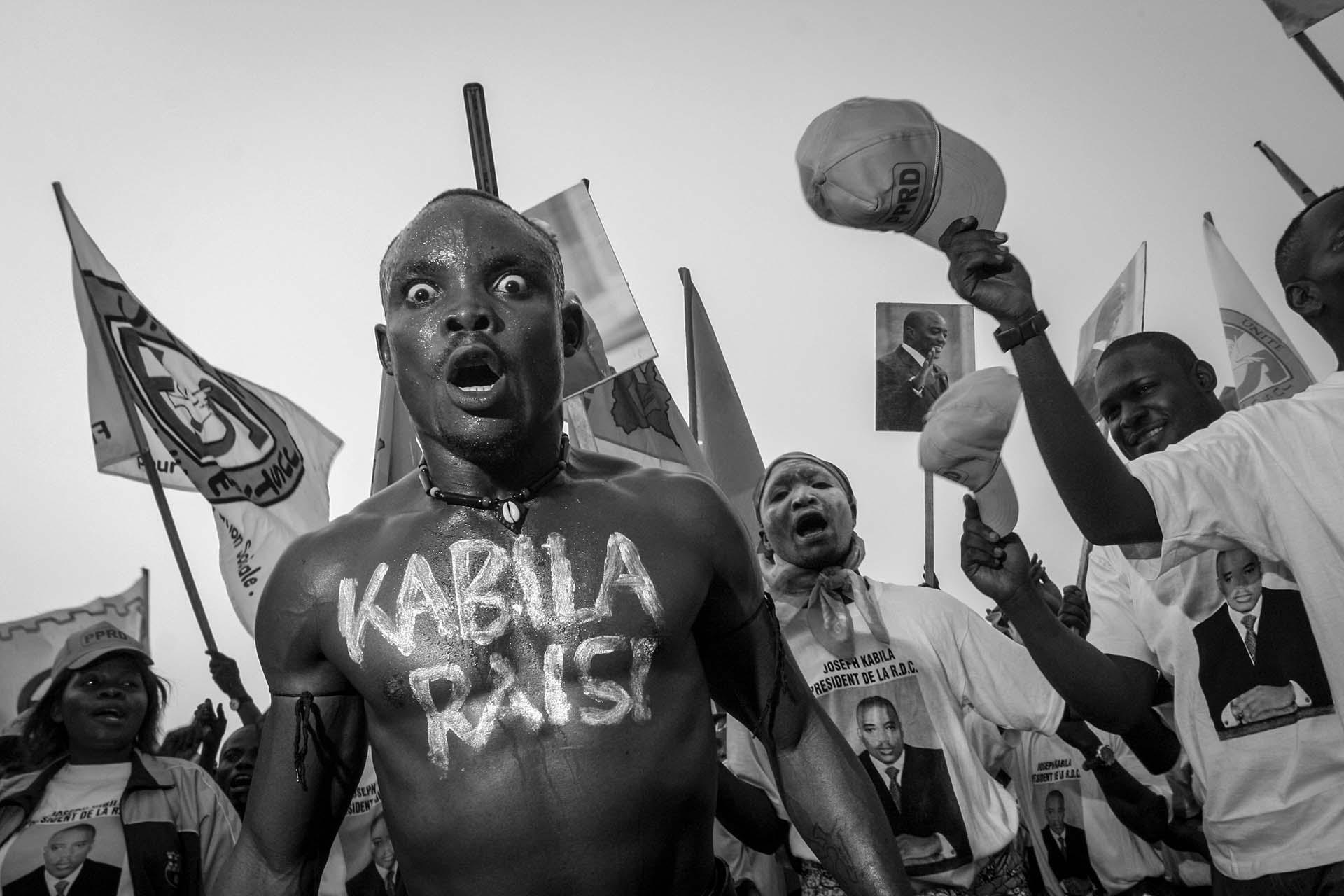
26 / 45
Supporters of Joseph Kabila in a frenzy at a rally in Kinshasa.
Supporters of Joseph Kabila in a frenzy at a rally in Kinshasa.
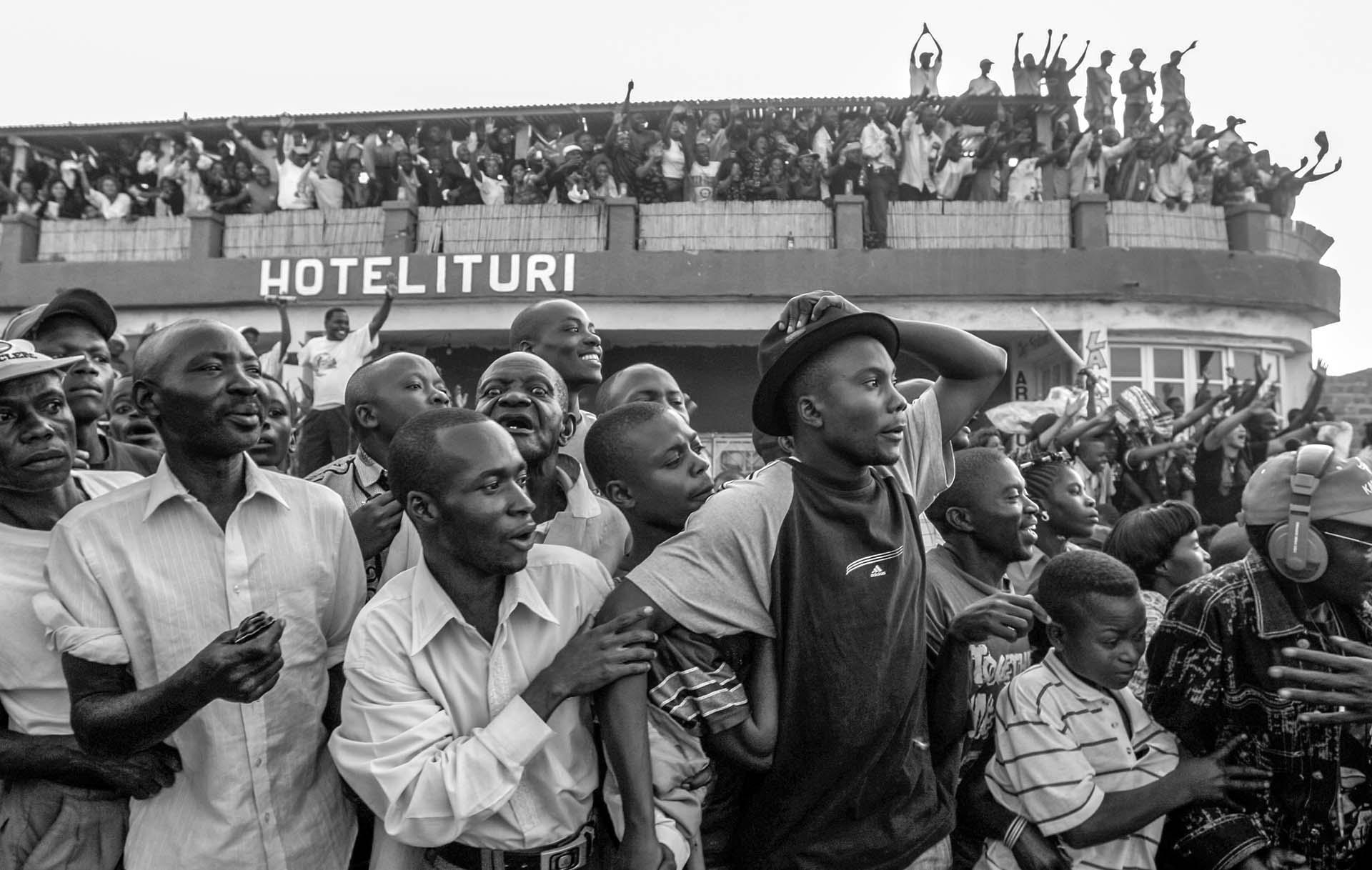
27 / 45
Supporters of Joseph Kabila, presidential candidate, show their support during his visit in Bunia, regional capital of Ituri in eastern DR Congo July 12, 2006.
Supporters of Joseph Kabila, presidential candidate, show their support during his...
READ ON
Supporters of Joseph Kabila, presidential candidate, show their support during his visit in Bunia, regional capital of Ituri in eastern DR Congo July 12, 2006.
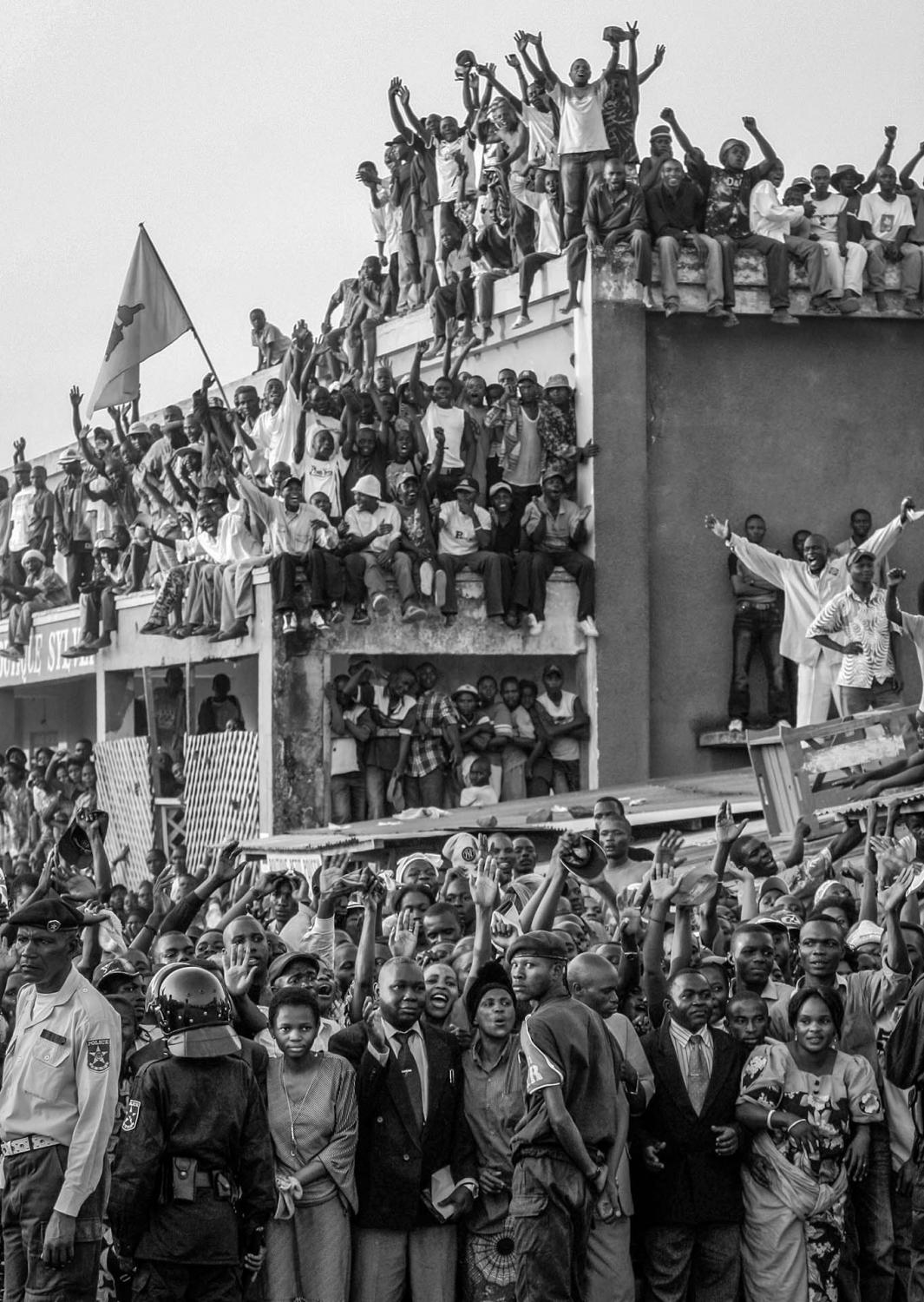
28 / 45
Supporters of presidential candidate Joseph Kabila show their support during his visit in Bunia, regional capital of Ituri in eastern DR Congo July 12, 2006.
Supporters of presidential candidate Joseph Kabila show their support during his...
READ ON
Supporters of presidential candidate Joseph Kabila show their support during his visit in Bunia, regional capital of Ituri in eastern DR Congo July 12, 2006.
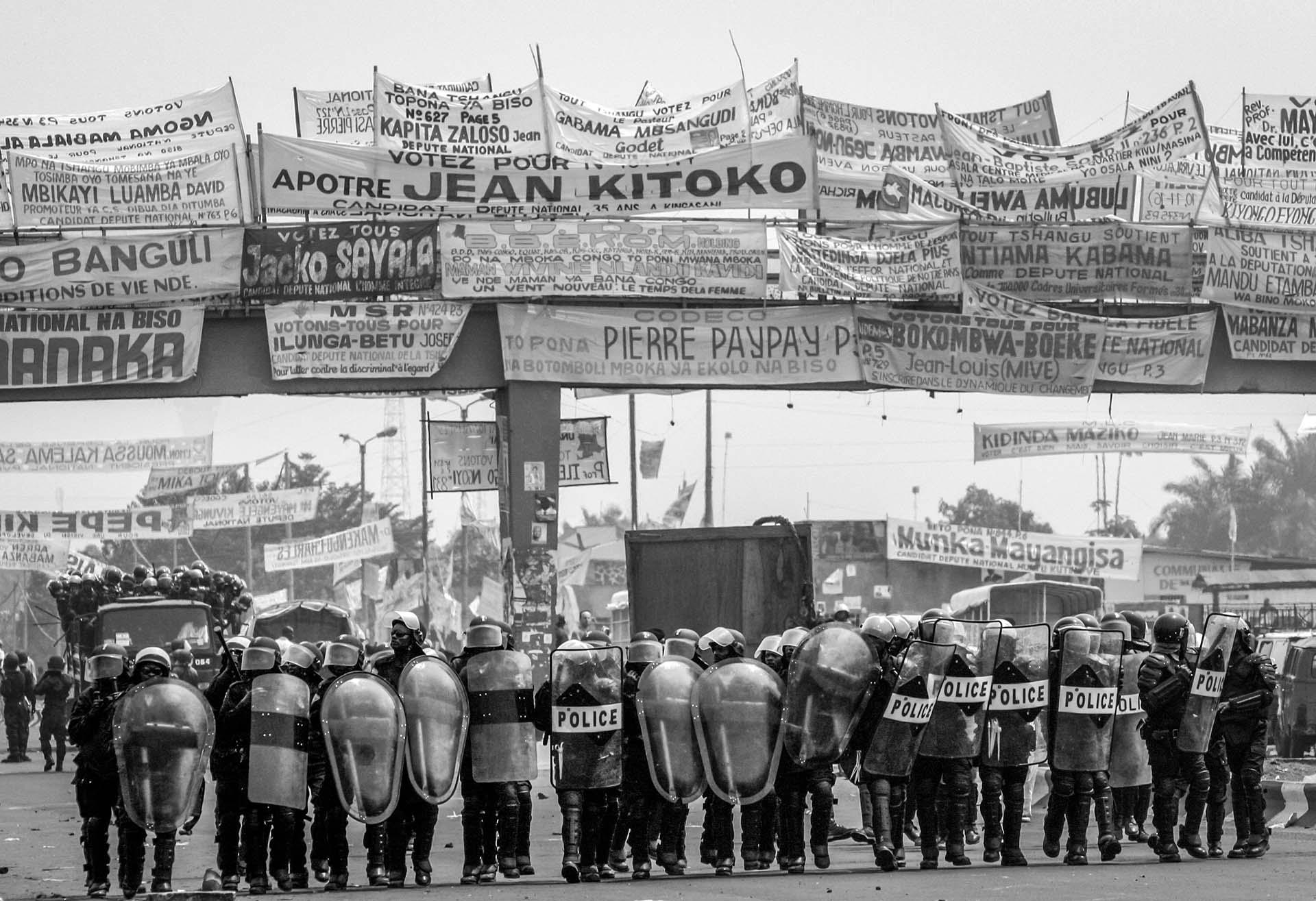
29 / 45
Armed with new EU-supplied equipment, riot police advance towards protesters in Kinshasa, DR Congo. Above them are campaign posters for 32 presidential and over 950 legislative candidates.
Armed with new EU-supplied equipment, riot police advance towards protesters in...
READ ON
Armed with new EU-supplied equipment, riot police advance towards protesters in Kinshasa, DR Congo. Above them are campaign posters for 32 presidential and over 950 legislative candidates.
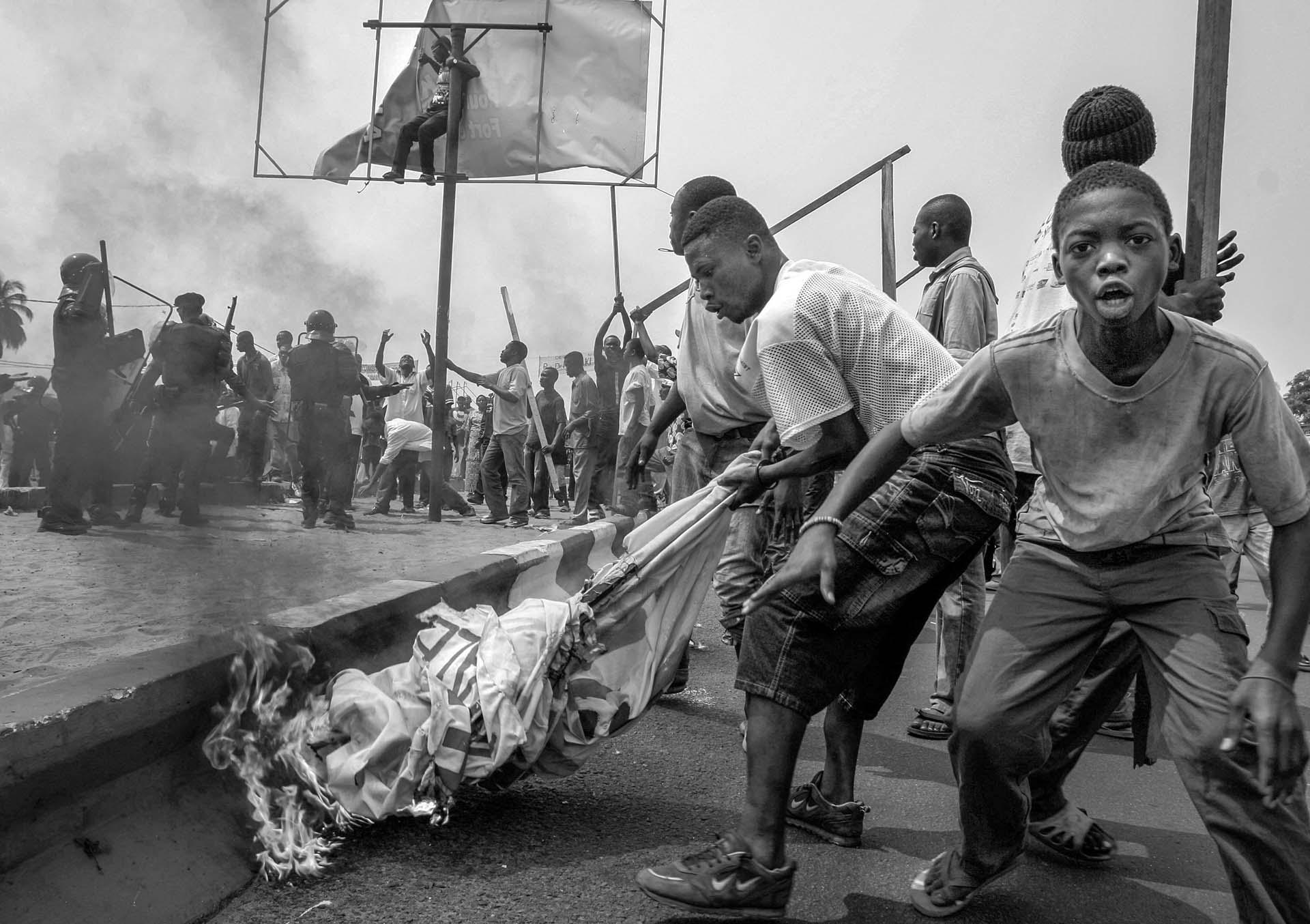
30 / 45
Supporters of UDPS, an opposition party which boycotted the election, burn campaign posters of candidates on the streets of Kinshasa, DR Congo.
Supporters of UDPS, an opposition party which boycotted the election, burn campaign...
READ ON
Supporters of UDPS, an opposition party which boycotted the election, burn campaign posters of candidates on the streets of Kinshasa, DR Congo.
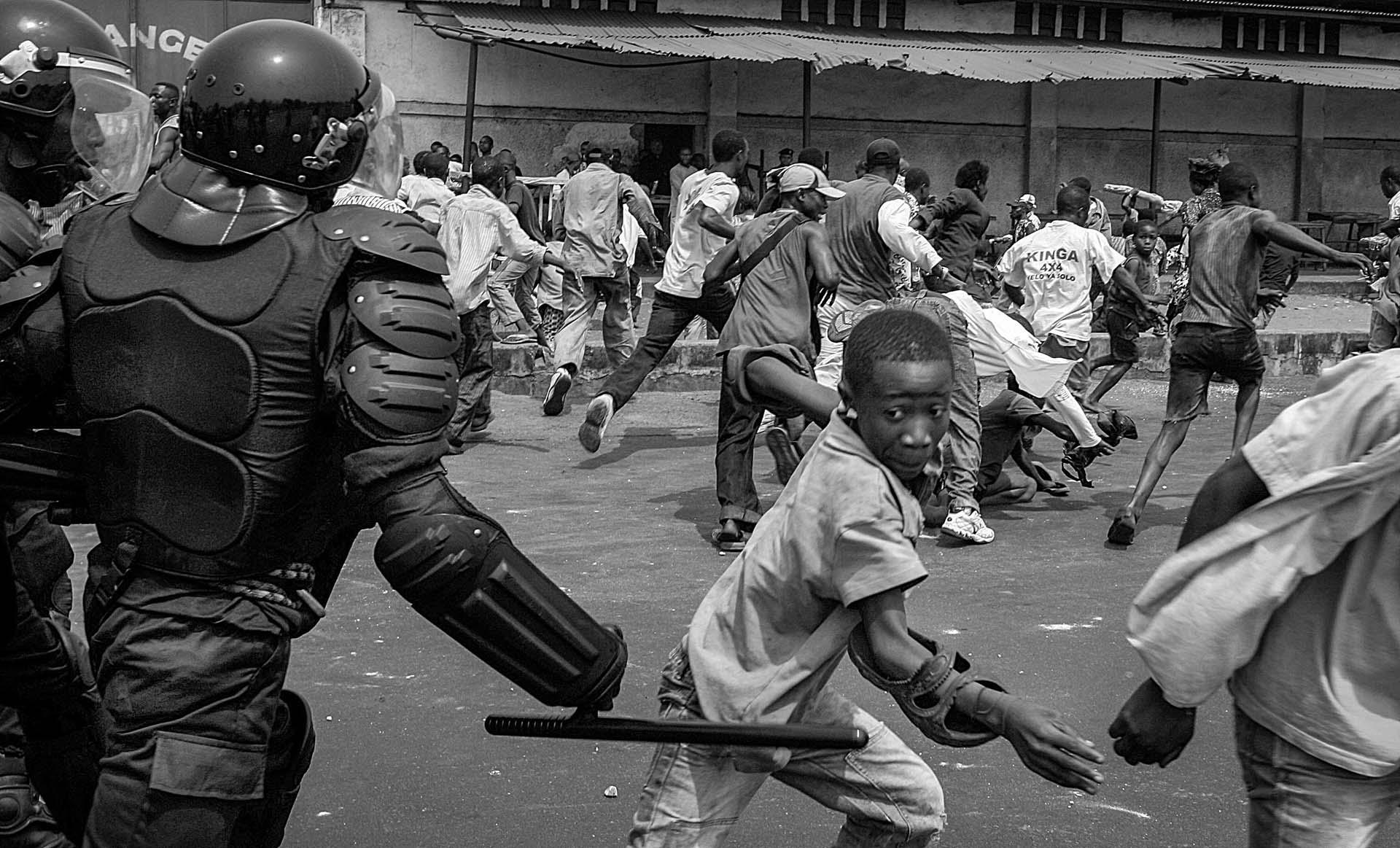
31 / 45
Riot police advance to UDPS protesters in Kinshasa, DR Congo.
Riot police advance to UDPS protesters in Kinshasa, DR Congo.
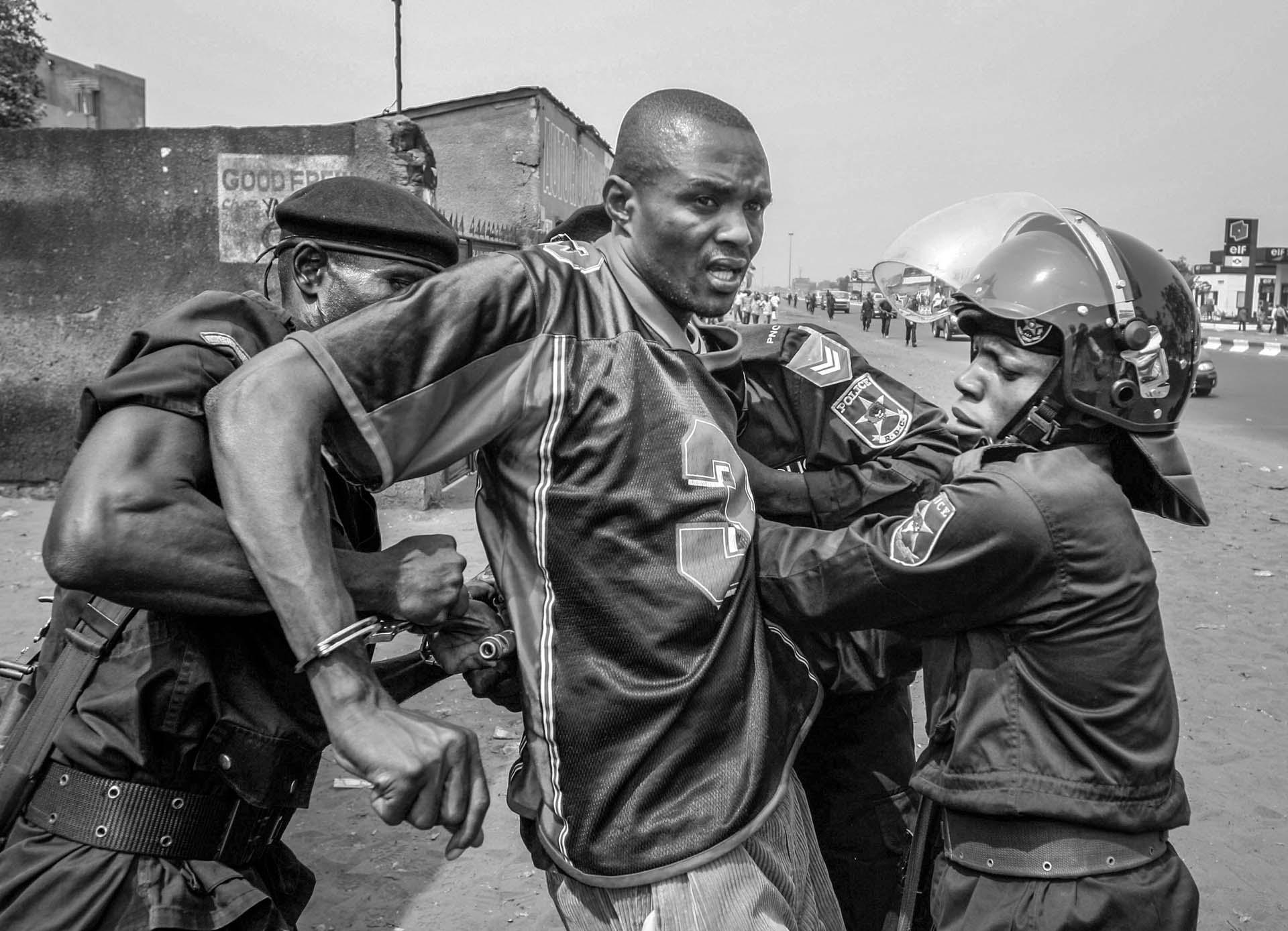
32 / 45
Riot police arrest a supporter of UDPS, Congo's main opposition party which boycotted the upcoming Presidential and National election, on the street of Kinshasa, DR Congo on June 30, 2006, the nation's independence day.
Riot police arrest a supporter of UDPS, Congo's main opposition party which...
READ ON
Riot police arrest a supporter of UDPS, Congo's main opposition party which boycotted the upcoming Presidential and National election, on the street of Kinshasa, DR Congo on June 30, 2006, the nation's independence day.

33 / 45
Congolese riot police arrest a UDPS supporter on the nation's independence day.
Congolese riot police arrest a UDPS supporter on the nation's independence day.
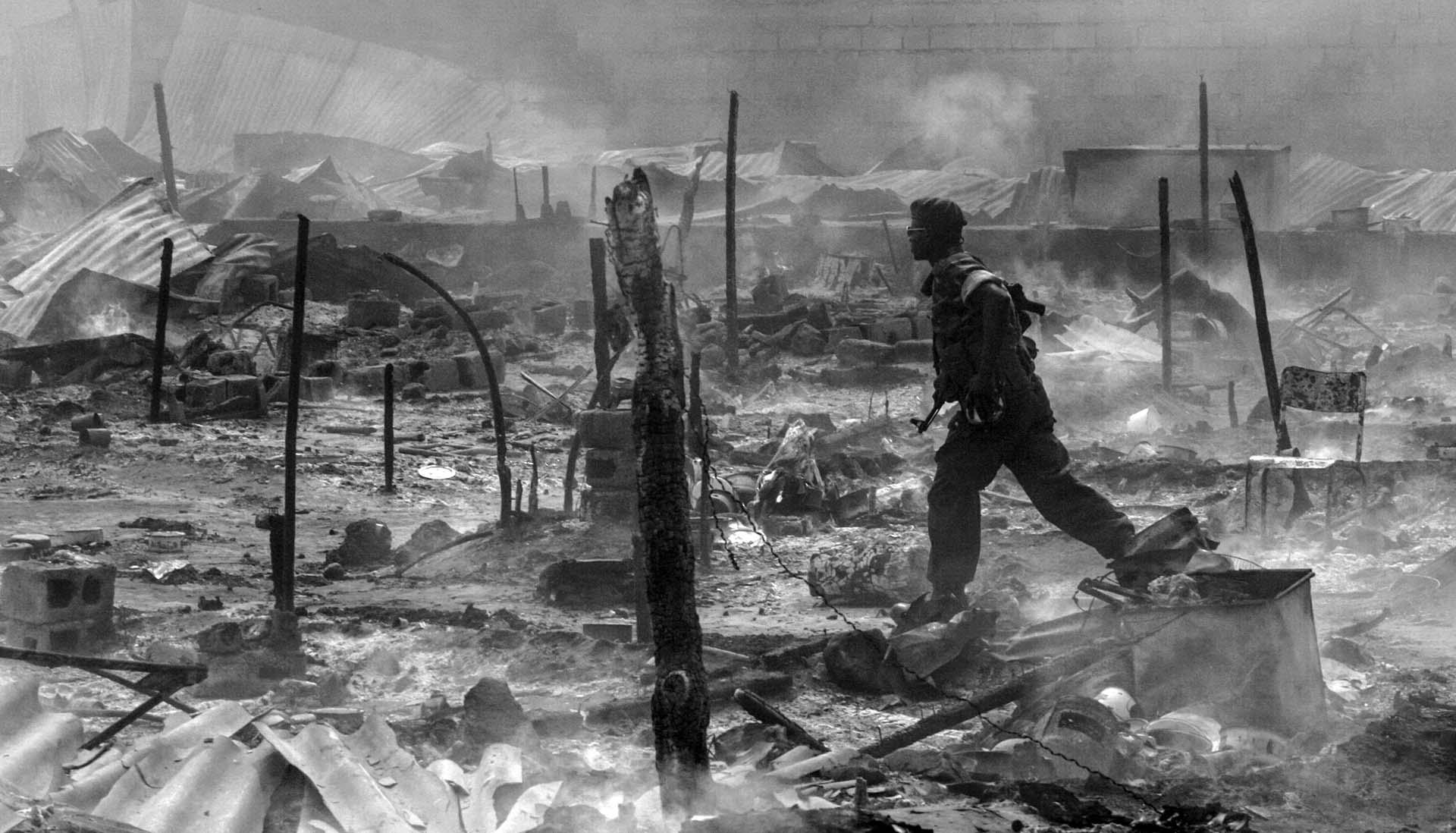
34 / 45
A soldier run through charred remains of the military barracks belonging to the militia of Jean Pierre Bemba, presidential candidate. Thus the tension is high in the capital ahead of the presidential election. Bemba accused President Kabila of the arson of the camp. July 27 2006
A soldier run through charred remains of the military barracks belonging to the militia...
READ ON
A soldier run through charred remains of the military barracks belonging to the militia of Jean Pierre Bemba, presidential candidate. Thus the tension is high in the capital ahead of the presidential election. Bemba accused President Kabila of the arson of the camp. July 27 2006
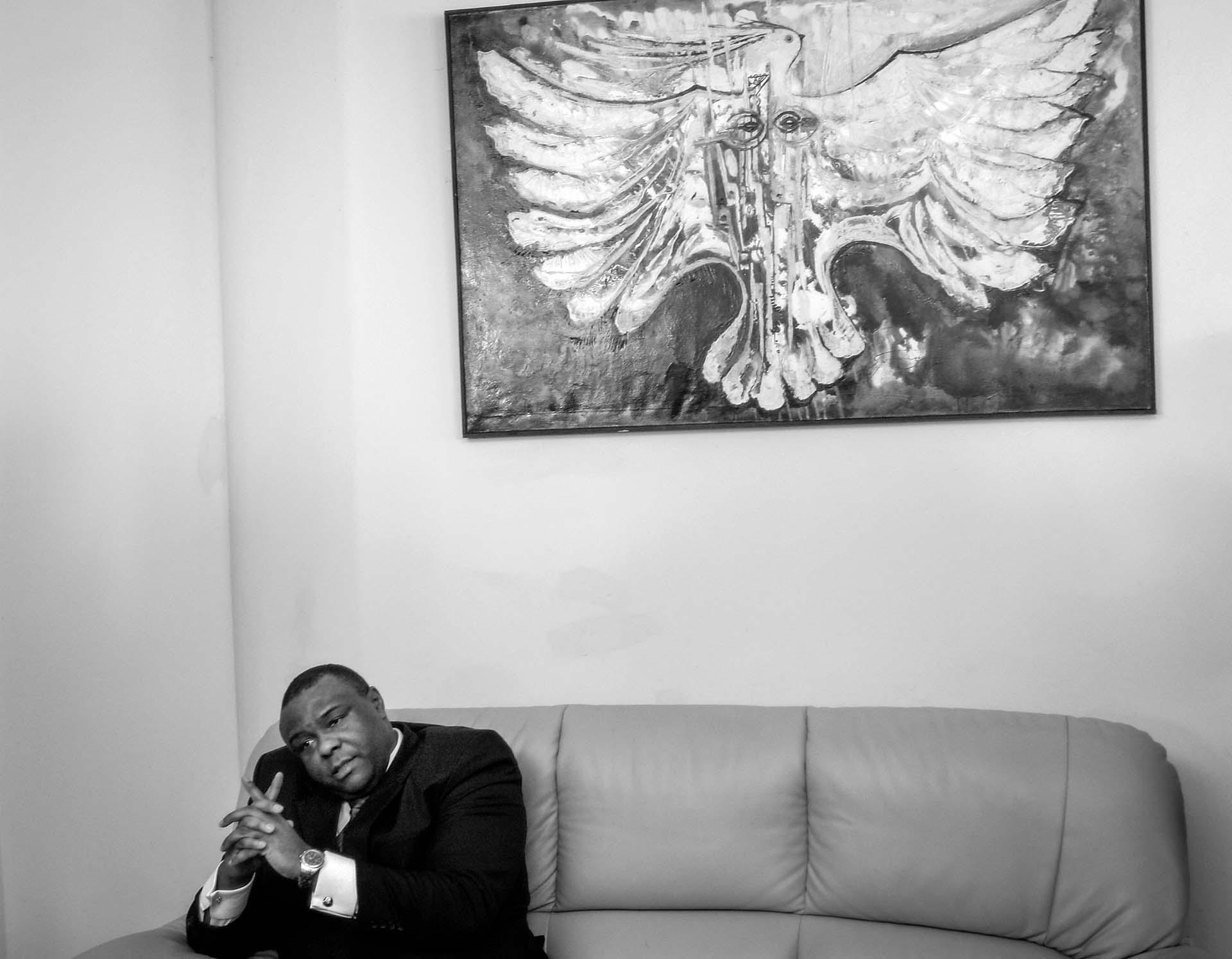
35 / 45
Jean Pierre Bemba, then vice president, former warlord, and presidential candidate, at his office in Kinshasa, after losing his bid to the Presidency. He was convicted in 2016 for failing to prevent his militia from committing crimes against humanity in the CAR that included murder, rape, and pillaging. He had been sentenced to 18 years in prison. However he was released after shocking reversal of his conviction by the ICC Appeals Chamber in 2018.
Jean Pierre Bemba, then vice president, former warlord, and presidential candidate, at...
READ ON
Jean Pierre Bemba, then vice president, former warlord, and presidential candidate, at his office in Kinshasa, after losing his bid to the Presidency. He was convicted in 2016 for failing to prevent his militia from committing crimes against humanity in the CAR that included murder, rape, and pillaging. He had been sentenced to 18 years in prison. However he was released after shocking reversal of his conviction by the ICC Appeals Chamber in 2018.
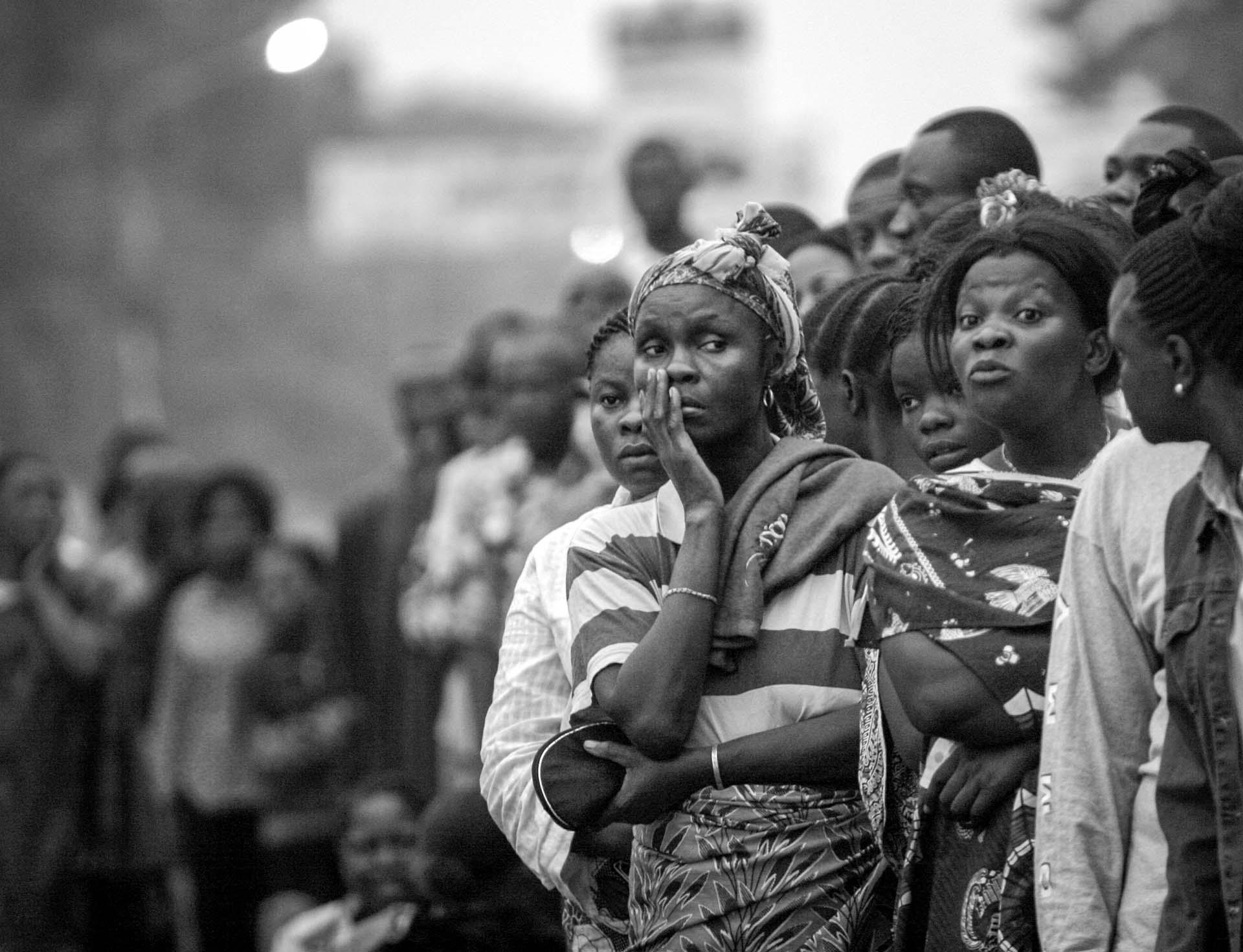
36 / 45
Congolese wait voters patiently for a polling station to open at sunrise in Kinshasa, DR Congo.
Congolese wait voters patiently for a polling station to open at sunrise in...
READ ON
Congolese wait voters patiently for a polling station to open at sunrise in Kinshasa, DR Congo.
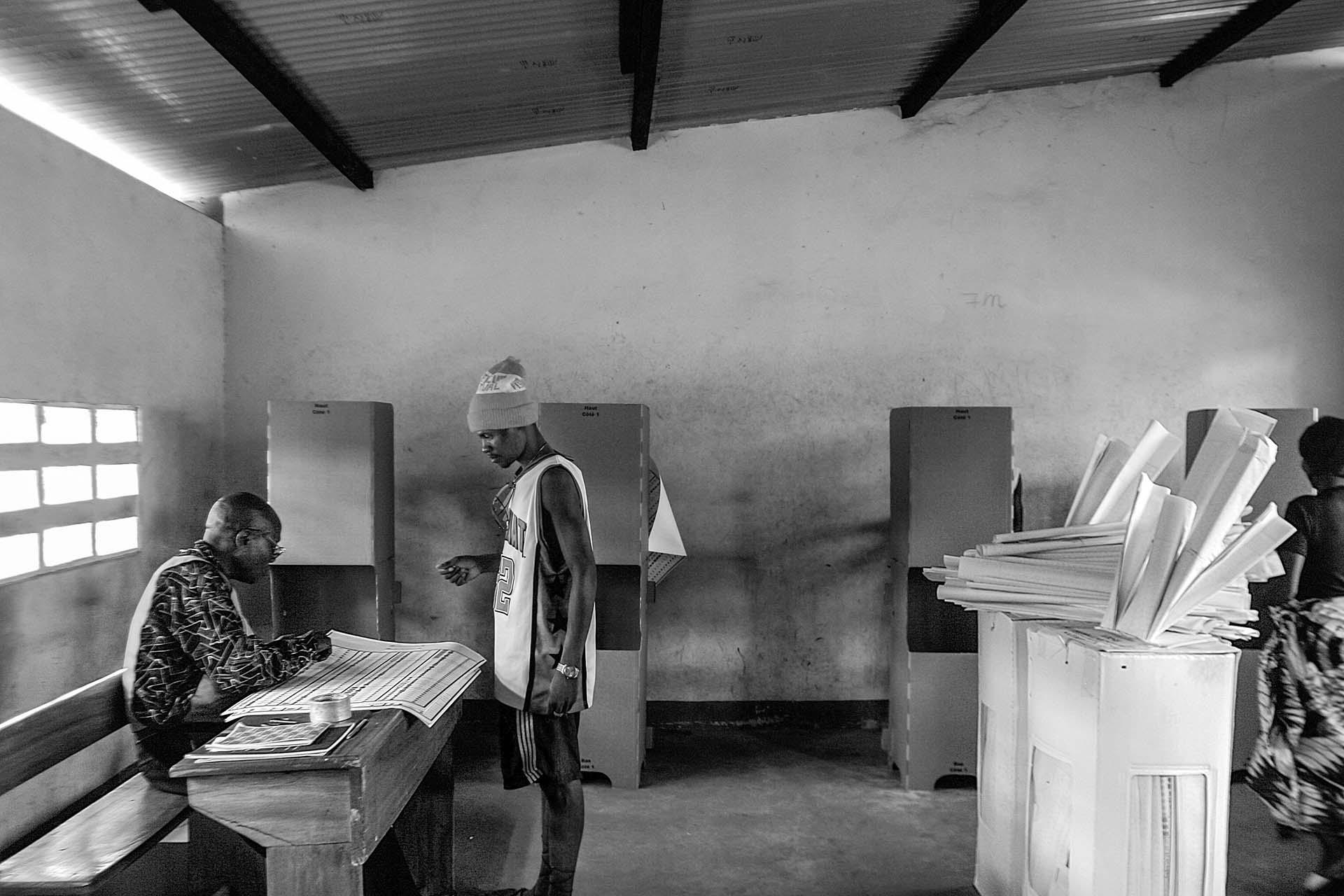
37 / 45
A ballot box is simply too small for 6-page ballot papers for parliament members.
A ballot box is simply too small for 6-page ballot papers for parliament members.
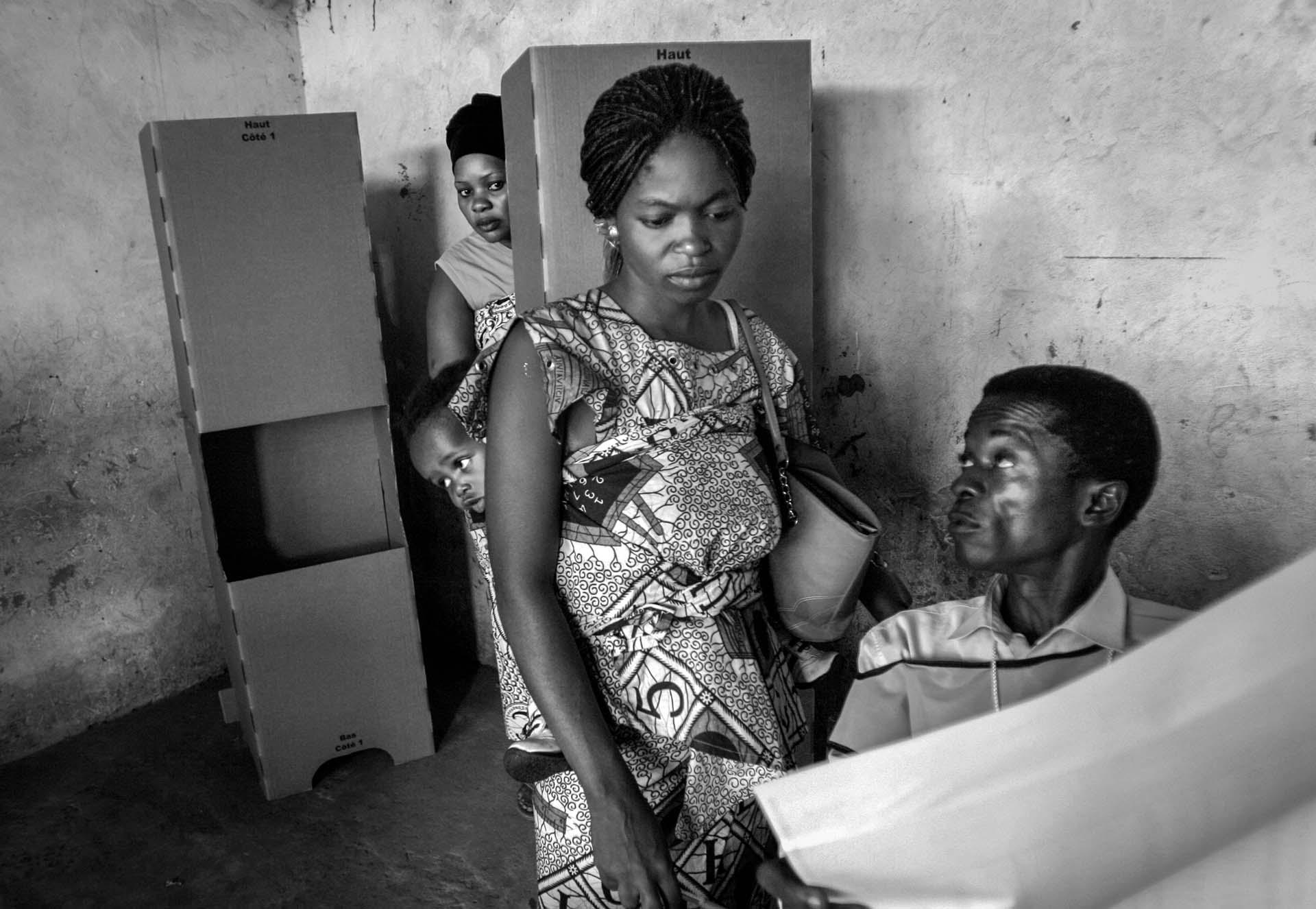
38 / 45
A Congolese election worker explains the long and complicated ballot papers to voters in Kinshasa. There are 32 presidential candidates and over 950 legislative candidates.
A Congolese election worker explains the long and complicated ballot papers to voters...
READ ON
A Congolese election worker explains the long and complicated ballot papers to voters in Kinshasa. There are 32 presidential candidates and over 950 legislative candidates.
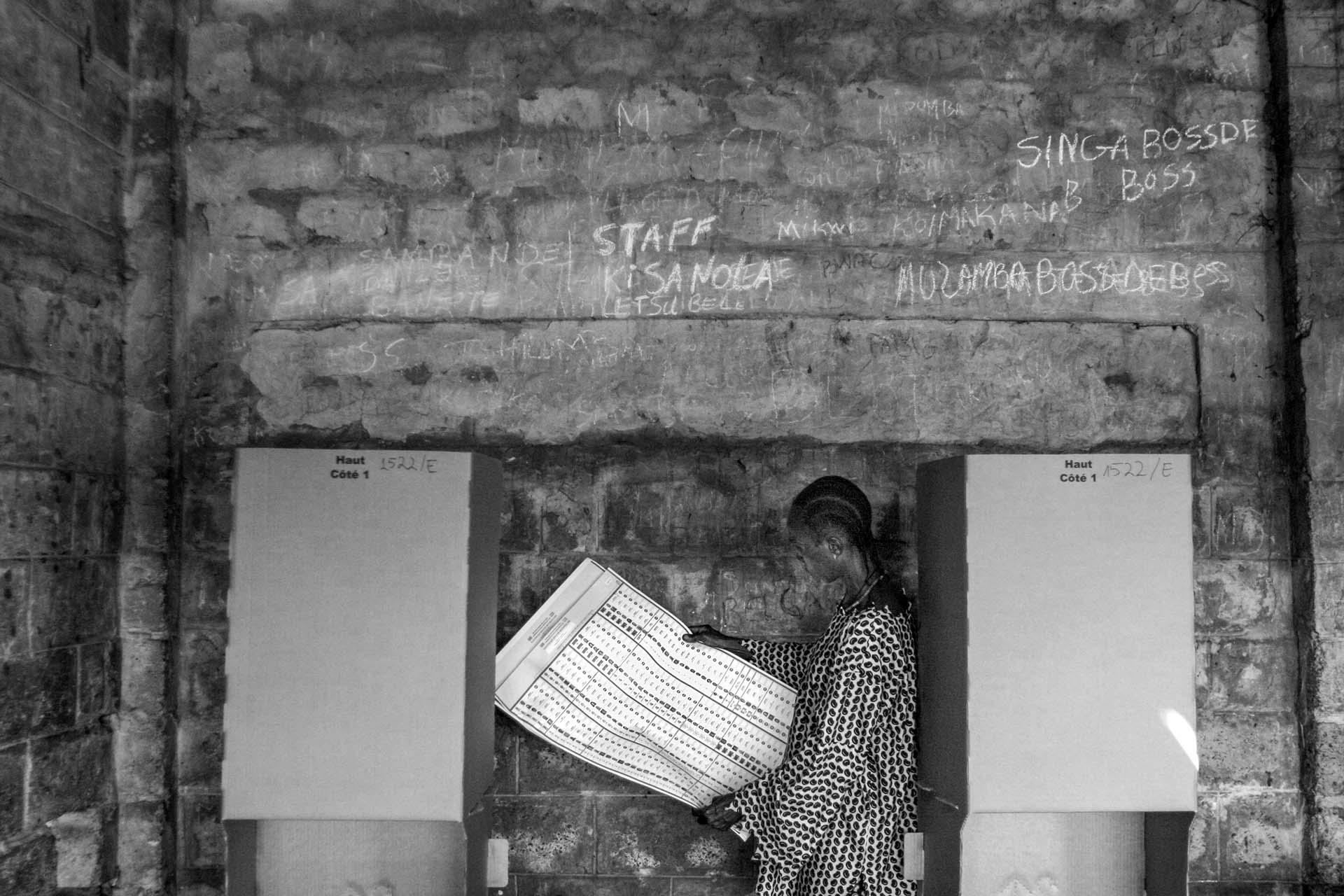
39 / 45
A Congolese man studies the 6-page ballot paper for legislative candidates at a polling station in Kinshasa.
A Congolese man studies the 6-page ballot paper for legislative candidates at a polling...
READ ON
A Congolese man studies the 6-page ballot paper for legislative candidates at a polling station in Kinshasa.
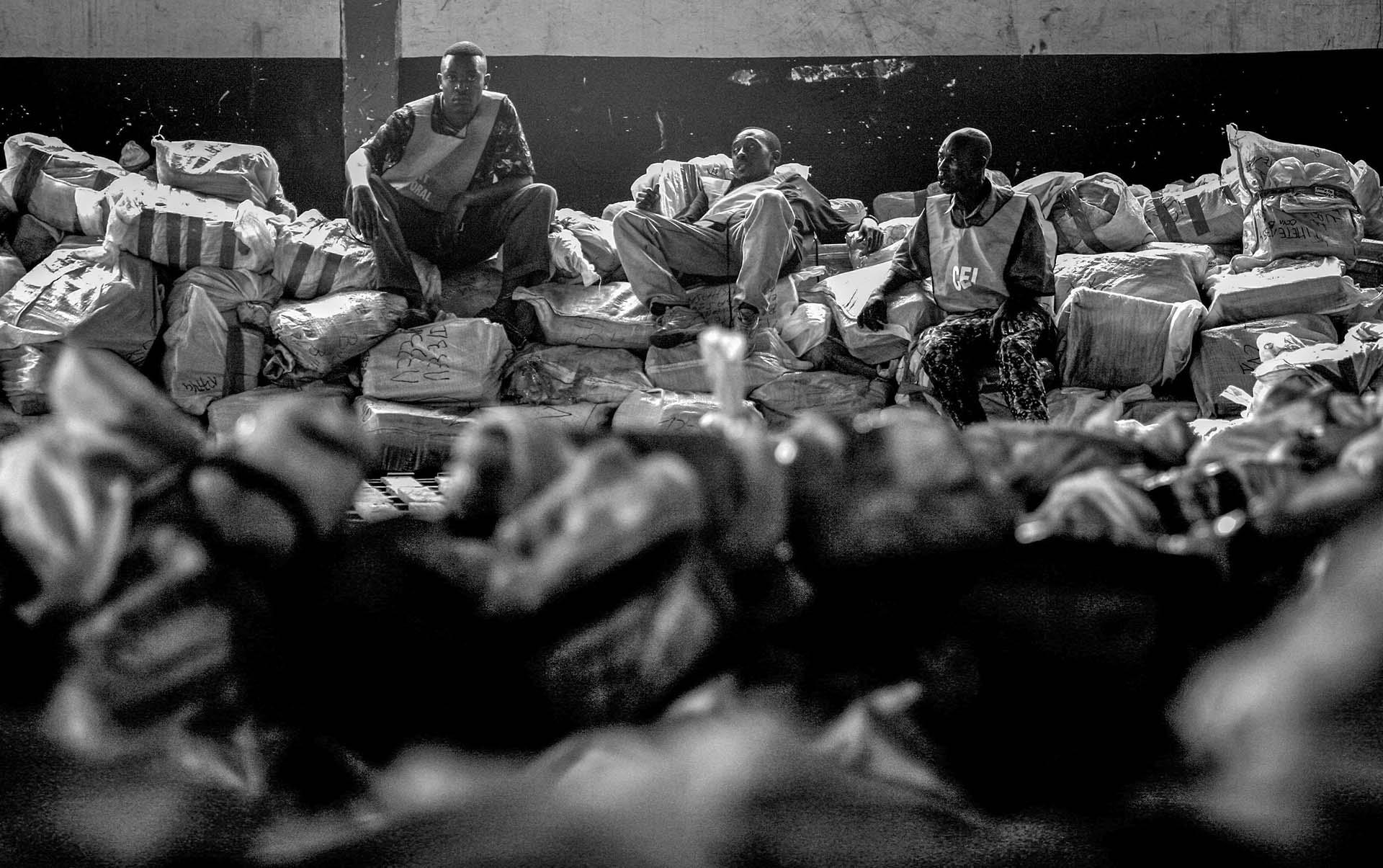
40 / 45
A tired electoral workers take a break from sorting ballots for counting and recorded at a heavily guarded storage facility in Kinshasa.
A tired electoral workers take a break from sorting ballots for counting and recorded...
READ ON
A tired electoral workers take a break from sorting ballots for counting and recorded at a heavily guarded storage facility in Kinshasa.
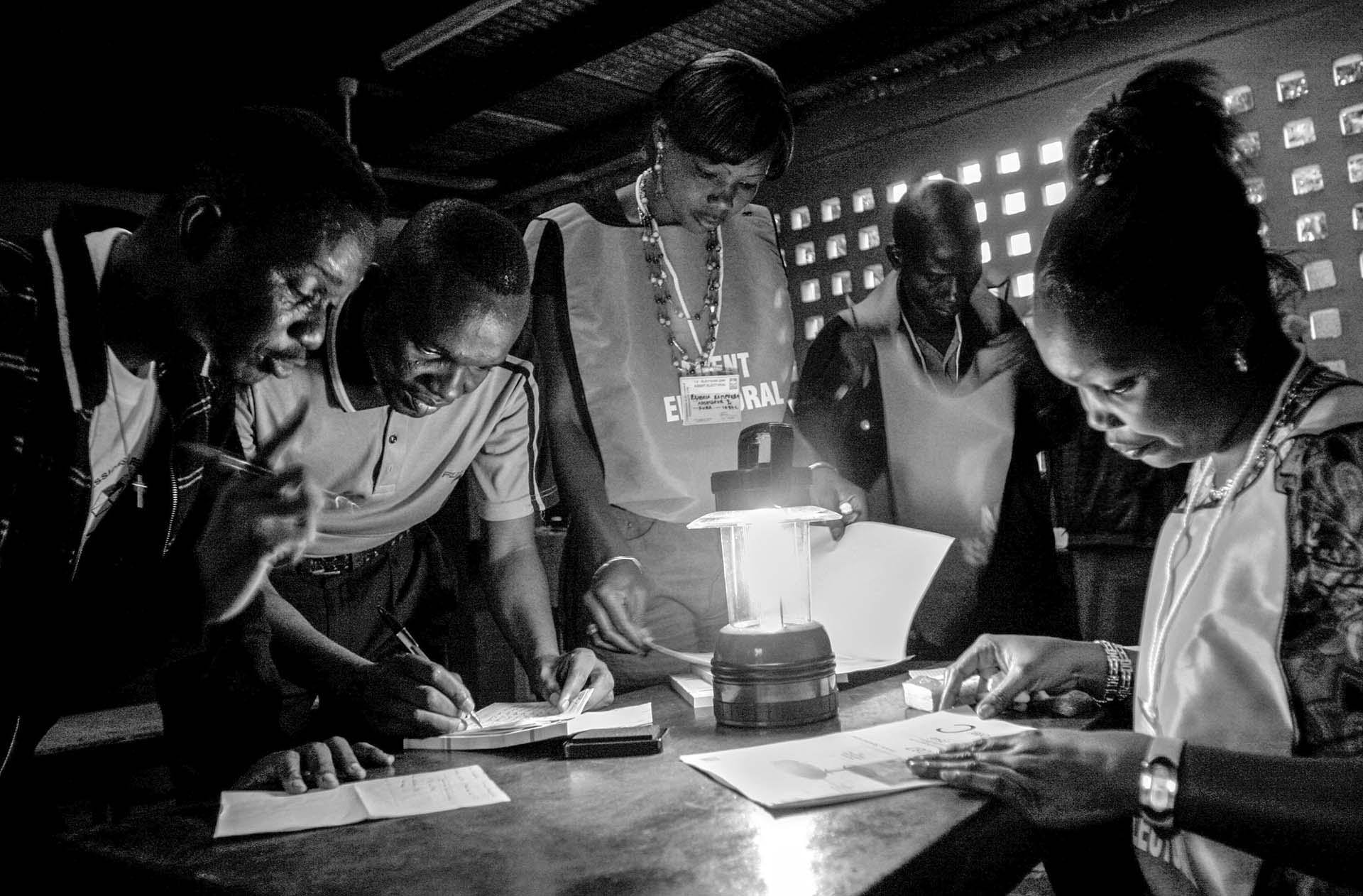
41 / 45
Election workers work on the last minute details before they open the ballot boxes in the early morning in Kinshasa, the capital of Democratic Republic of Congo for the 2nd round of the presidential election.
Election workers work on the last minute details before they open the ballot boxes in...
READ ON
Election workers work on the last minute details before they open the ballot boxes in the early morning in Kinshasa, the capital of Democratic Republic of Congo for the 2nd round of the presidential election.
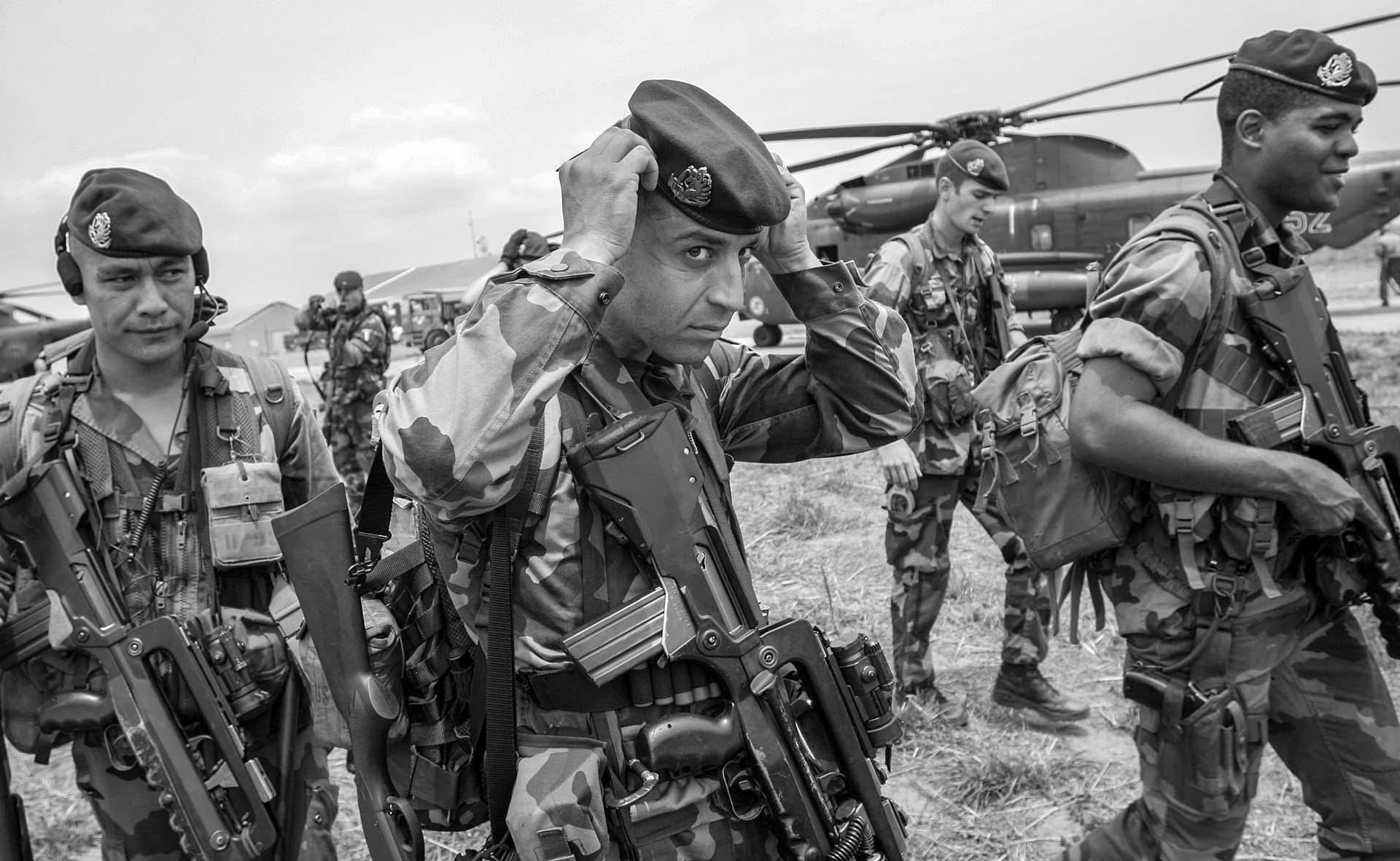
42 / 45
French paratroopers arrive in Kinshasa, DR Congo, ahead of the runoff of the presidential election.
French paratroopers arrive in Kinshasa, DR Congo, ahead of the runoff of the...
READ ON
French paratroopers arrive in Kinshasa, DR Congo, ahead of the runoff of the presidential election.
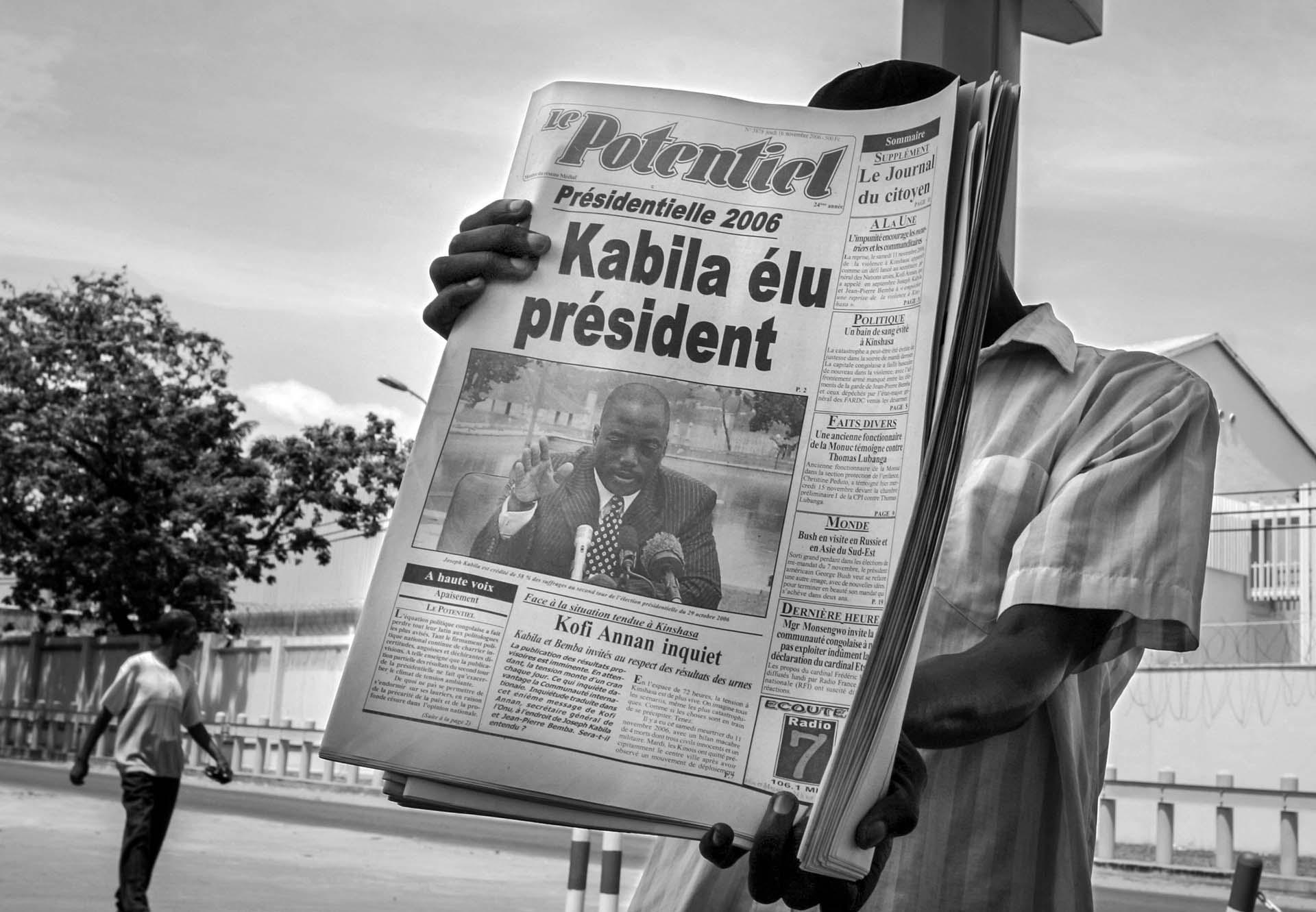
43 / 45
Joseph Kabila is announced as a winner of the presidential election.
Joseph Kabila is announced as a winner of the presidential election.
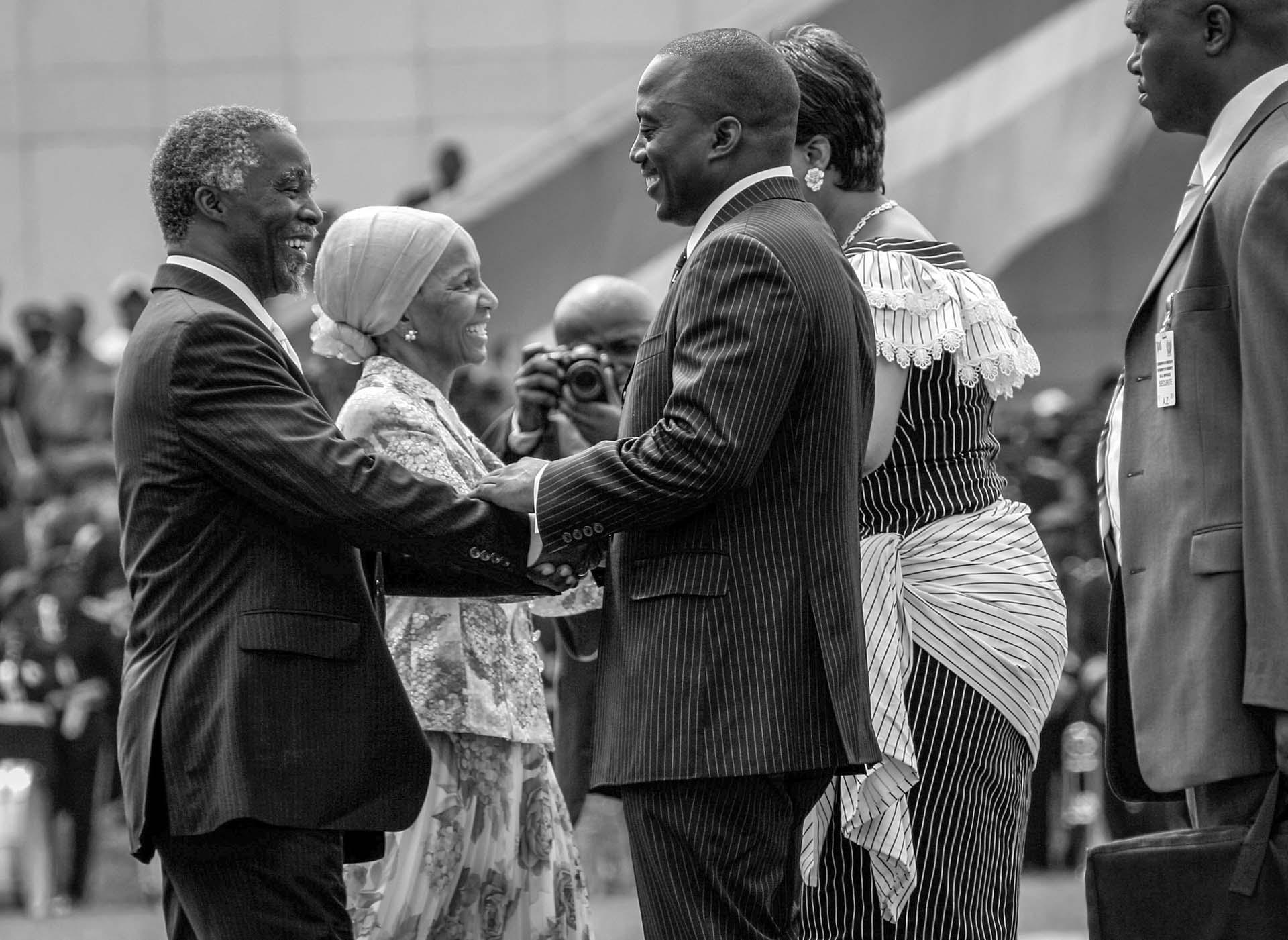
44 / 45
Joseph Kabila, a newly elected president of the Democratic Republic of Congo, is congratulated by Thabo Mbeki, South African president, during the inauguration ceremony in the capital Kinshasa.
Joseph Kabila, a newly elected president of the Democratic Republic of Congo, is...
READ ON
Joseph Kabila, a newly elected president of the Democratic Republic of Congo, is congratulated by Thabo Mbeki, South African president, during the inauguration ceremony in the capital Kinshasa.
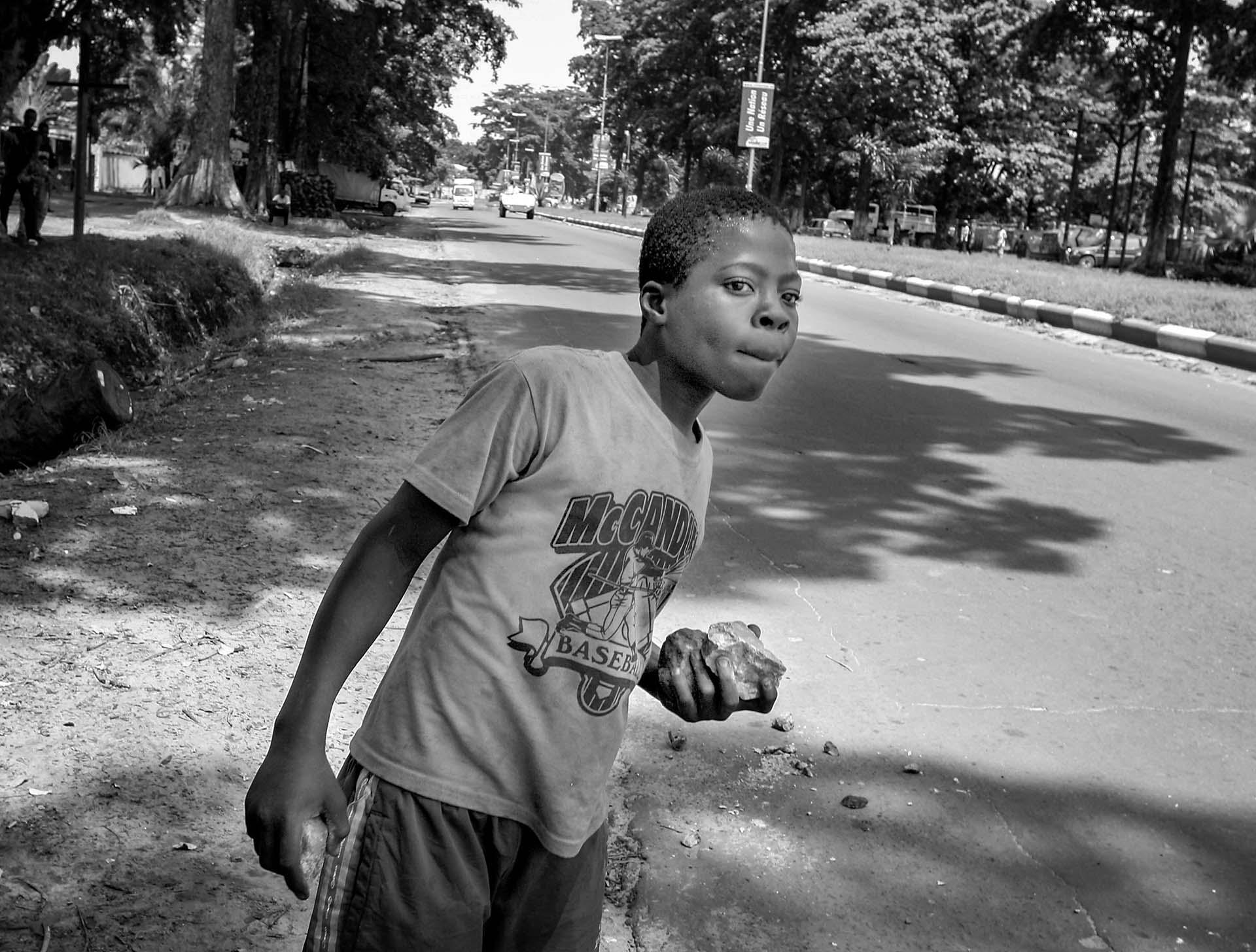
45 / 45
A Congolese youth looks for an opportunity to throw his rocks at police on the main street of Kinshasa. The day after Joseph Kabila was declared as the president, the air is tense in the capital.
A Congolese youth looks for an opportunity to throw his rocks at police on the main...
READ ON
A Congolese youth looks for an opportunity to throw his rocks at police on the main street of Kinshasa. The day after Joseph Kabila was declared as the president, the air is tense in the capital.




















Historic Election
Millions from across Democratic Republic of Congo, the vast Central African Country spanning an area the size of Western Europe, cast ballots for the first time in their lives on July 30, 2006, hoping it will finally end more than 40 years of civil war and dictatorships. Joseph Kabila, 35, and the outgoing president of transitional government faced his vice president of the same government, Jean Pierre Bemba, the only strong rival among more than 30 Presidential candidates.























